Overcoming Spiritual Fatigue
Intentional Grandparenting
Discipled by Daniel
A "Blanket Statement"
Uncovered
How to Raise an Ebenezer
Sowing Seeds of Faithfulness

onemagazine.com • @onemagazinefwb APRIL-MAY • 2023
Discipleship The PUZZLE

































RALEIGH, Nc JULY 16-19 foundation@nafwb.org | 877-336-7575 | www.fwbgifts.com You can never completely prepare your loved ones for your passing, but you can leave them a well-prepared plan for your estate. Since 2013, Free Will Baptist Foundation and Cornerstone Estate Planning have helped thousands of families avoid the legal and financial nightmares of probate court that can result in substantial losses. Start now, and give your family the gift of a well-prepared plan for the future. Is your family prepared for your death?
To communicate to Free Will Baptists a unifying vision of our role in the extension of God’s Kingdom




04 First Glimpse: Long Obedience in the Same Direction 19 Primary Source: A Pair of Pigtails 30 Intersect: Love More. Live Quietly. Mind Your Own Business. Work Hard. Repeat. 35 Brown on Green: Volatility 39 Leadership Whiteboard: Two Powerful Words Leaders Rarely Use 48 Refresh: Multi-Ethnic Ministry in the Local Church 62 Better Together: The Gift of Encouragement N EWS 51 Across the Nation 54 Around the World 59 2023 NAFWB Convention Pre-Registration Form 61 About the Denomination
06 Overcoming Spiritual Fatigue 10 War in the Wilderness 12 Intentional Grandparenting 14 Thriving in Multicultural Soil 17 Discipled by Daniel 20 Solving the Puzzle of Discipleship 23 Recipe for Life: Country Beef Pie 24 A "Blanket Statement" Uncovered 26 Grounded: Preparing Your Teen for the Real Financial World 28 Back to the Basics of Theological Youth Ministry 32 Discussing Doctrinal Differences 36 A Road Named ZZ 40 How to Raise an Ebenezer 42 There Is Always a Story: Remembering Thomas Luther Marberry (1949–2021) 46 Sowing Seeds of Faithfulness 50 Just Keep Running 52 Do the Little Things Well 56 Book Review: God in Eternity and Time: A New Case for Human Freedom by Dr. Robert Picirilli 58 2023 NAFWB Convention Preview contents APR - MAY 2023 • VOLUME 19 • ISSUE 3 Published bi-monthly by the National Association of Free Will Baptists, Inc., 5233 Mt. View Road, Antioch, TN 37013-2306. ISSN 1554-3323 Non-profit periodical postage rate paid at Antioch, TN 37011 and additional offices. Postmaster, send address changes to: ONE Magazine, PO Box 5002, Antioch, TN 37011-5002. Phone: 877-767-7659
C OLUMNS
ARTICLES
10 17 42
Long Obedience in the Same Direction
BY ERIC K. THOMSEN
Just over four years. According to the Bureau of Labor, that’s the average amount of time today’s employee sticks with a job before moving on to greener pastures. With each new generation, the value placed on job longevity seems to diminish.

Contrast that with 50 years in one spot. The concept almost seems laughable by today’s drive-though, sound bite, microwavable, fast-lane, overnight shipping, TikTok culture. Yet, remarkably, last year, three Free Will Baptist pastors each marked a half century at a single church.
January 16, 2022, the congregation at Samantha FWB Church in Springfield, Ohio, honored pastor Wiley Perkins (who died the following December) for 50 years at the church. July 31, Larry Condit celebrated 50 years at Capitol FWB Church in Sacramento, California. September 18, Vernon Maggart completed 50 years as pastor of Freeman Chapel in Easton, Missouri.
Three men. A hundred and fifty years. A century and a half of ministry. And the numbers truly get staggering when you add up sermons, weddings, funerals, hospital visits, phone calls, revivals, outreach events, special services, and classes taught.
For these men, and others like them, the rigors of ministry are standard fare. “I’ve been here 50 years because the
Lord has blessed me,” Pastor Perkins told a news reporter. “So brag on God for helping me.”
“I have always sought the Lord’s leadership, and He has just left us here,” says Pastor Maggart. “We’ve never felt led to go anywhere else.”
Seems to me, these men were too busy about the Lord’s work to look for greener pastures.
Let’s put things in perspective. When these men began their pastorates:
• Richard Nixon was President.
• Harry S. Truman and J. Edgar Hoover had just died.
• The Vietnam War was ongoing.
• The Watergate scandal was exploding into the public eye.
• Loretta Lynn won big honors for “Coal Miner’s Daughter.”
• The Dow Jones industrial average broke 1,000 for the first time.
• The Apollo Mission put a man on the moon for the last time.
• Oh, and yours truly made his first appearance on planet earth.
In short, 50 years is a long time. I am grateful to these men and others like them for reminding us young whippersnappers a life of faithfulness is possible. That we can thrive through the ups and downs of ministry. That we can survive the mundane moments that often become the fabric of a life spent in God’s work. To me, they are living examples of what theologian Eugene Peterson described as “a long obedience in the same direction.”
I want to walk in their footsteps.
Read more about Larry Condit in “Sowing Seeds of Faithfulness,” page 46.
About the Columnist: Eric K. Thomsen is managing editor of ONE Magazine. Email: eric@nafwb.org.
FIRST GLIMPSE
4 | ONE Magazine April-May 2023
Gerald W. Gann Celebrates 40 Years
Eggville, MS—After graduating from Welch College in 1980, Dr. Gerald Gann and his wife Brenda moved to Mississippi to attend Wesley Biblical Seminary in Jackson. While in Jackson, he and his family attended Pearl FWB Church where he was mentored by J. L. Gore. After graduation in 1982, with Gore’s recommendation, Gann accepted the pastorate of Eggville FWB Church.
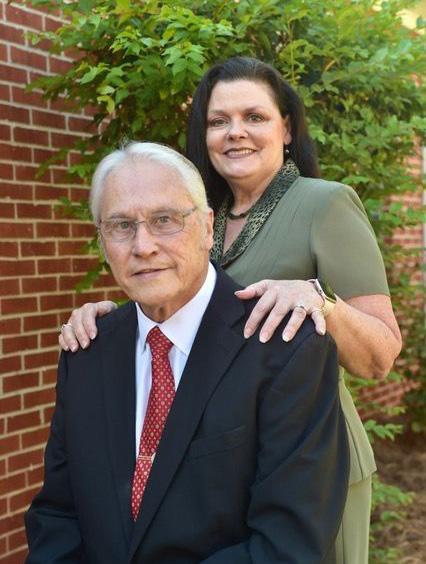
During his 40-year ministry at Eggville, Dr. Gann and the congregation have built a new auditorium and fellowship hall, added two sections of Sunday School rooms and a gym, and purchased another parsonage. The Ganns’ chil-

dren Paul and Leanna have grown, married, had children of their own and now attend the Eggville Church.
Dr. Gann reflects, “I am blessed to pastor a wonderful group of people who love the Lord and seek to please Him. I feel blessed to be part of this congregation of people. I give praise to God for the strength He has provided through these years. So many wonderful people have touched my life at Eggville. Brenda and I give thanks for every one of them.”
The congregation at the Eggville Church appreciates Dr. Gann’s leadership and faithful preaching God’s Word without reservation. We salute the Ganns for their years of ministry.
—Submitted by the Eggville FWB Congregation
EDITOR-IN-CHIEF: Eddie Moody MANAGING EDITOR: Eric Thomsen
ASSOCIATE EDITORS: Ken Akers, Adra Brown, David Brown, Kathy Brown, Jeff Caudill, Danny Conn, Claiborne Scott, Deborah St. Lawrence, Phyllis York
LAYOUT & DESIGN: Randall House Publications DESIGN MANAGER: Andrea Young DESIGN: Marianne Stewart PRINTING: Randall House Publications While
PHOTO
Eric Thomsen, Shutterstock.com, Istockphoto.com, Stockxpert.com, Designpics.com, Rodney Yerby.
Worship with us this July!
ONE Magazine is
to the reader free of
tax-deductible
appreciated.
make a donation,
send check or money
Magazine,
provided
charge,
donations are both accepted and
To
simply
order to ONE
PO Box 5002, Antioch, TN 37011-5002.
Join the convention choir and orchestra during the 2023 National Convention in Raleigh, North Carolina. To participate in the choir, access the music prior to the convention at fwbworship.com. Once onsite, the choir will rehearse each evening before convention services. Contact Kevin Justice for more info: kevin@unityfwb.org Find additional convention information: nafwb.org/convention
CREDIT:
. . . . . . . . . . . . . . . . . . . . . . . . . . . . . . . . . . . . . . . . . . . . . . . . . . News About the Denomination
BY MARIANNE HOWARD
The demand of daily leadership is draining. As we juggle the tasks of managing programs, budgets, schedules, teaching, and navigating ever-present opinions, we quickly lose sight of our priorities spiritually, personally, and professionally. Forgetting we are stewards and servants in God’s ministry, we begin to rely more on our own skills and abilities than on the wisdom and power of God.
Though we long to lead well, we have allowed the subtle yet rigorous work of shepherding to rob us of hope and lead our hearts into distracted and weary places. Many times, with great intentions, we neglect the soul and its connection to God. There is a pressing need for restorative rest and soul care in the lives of leaders. We
see leaders abandon the ministry in record numbers due to disillusionment, weariness, overbearing scrutiny, and personal scandals.
Spiritual fatigue and burnout are a real threat to you, your family, your ministry, and your church. If the devil can exhaust you, he will. If he can destroy your health,


6 | ONE Magazine April-May 2023
he will. If he can make you hate your job, he will. If we want to find a way to defeat the enemy’s schemes, we must identify unhealthy behaviors and eliminate them from our daily routines. Some things need to change if we want to last in ministry.
In our most difficult moments of ministry fatigue, we need to know the heart of Jesus. He understands every trouble, temptation, frustration, and drama you face. Jesus sees you. He understands the whisper of temptation that wants to hurry ahead instead of waiting for the Father’s timing. He understands the exhaustion of pouring Himself out for others. He knows the frustration of people committed to misunderstanding Him. He is familiar with what it means to feel the loneliness of abandonment and the heartbreak of betrayal.
The symptoms of spiritual fatigue do not indicate the need for a vacation, but that we desperately need rest—soul rest, restorative rest. Rest is about renewal, where God meets the deepest needs of our souls. Jesus never called us to a life of endless exhaustion. He understood that to last, we must regularly re-orient our lives around the One who calls us.
We don’t wander into restful rhythms; we must work diligently at rest. If we prioritize intentional rest, it will show. It will be obvious to us, our family members, those we lead, and most importantly, God. We can talk about rest, but none of it matters until we take time to physically stop our work and rest in God. We must develop habits of rest. If you’re new to the idea, here are six helpful suggestions: Slow Down. We live in a chaotic state of rush, race, and strife. We must slow down to recognize our deepest need is for God Himself. According to Scripture, the answer to spiritual burnout is intimacy with God and the renewing of the Holy Spirit (Isaiah 44:3). Make slowing down a part of your life; focus not so much on yourself but God, His leading, and His presence. Your pace matters because the pace of your life reveals who leads and shepherds your soul.
Be Attentive. Guard your devotion. Spiritual attention is the perfect weapon to use against distraction. Attention is the skill of withdrawing from everything to focus on essential things. Remember, the goal of distraction is attentional negligence, dragging the heart’s attention away from Christ. Give Christ your fully devoted attention, not just scattered glances. “Behold your God” (Isaiah 40:9). Focus on Him as though your life depends on it. Do the disciplined work to avoid the chirps and dings this world offers.
Examine Your Habits. If we want to grow in our love for Jesus, we must do something to us. Identify and eliminate—or at least reduce—the things distracting you. Develop distraction-reducing habits. Make time to feast at the table with Jesus rather than settling for table scraps. “Let the word of Christ dwell in you richly,” “Seek first the kingdom,” and “Love the Lord your God with all your heart, soul, mind, and strength.” All means all; don’t let any parts of you be divided or distracted.
Four Symptoms of Spiritual Fatigue:
SPIRITUAL NEGLECT:
You fail to cultivate and prioritize a relationship with the Lord, taking shortcuts spiritually.
DANGEROUS DISTRACTIONS:
You seek satisfaction in other people, places, or things in such a way that God is forgotten.
ADAPTING TO EMPTY:
You willfully acknowledge you are empty and depleted, and you push through and lead anyway.
SELF-SUFFICIENCY:
You continue to make it all happen through the efficiency of your systems, resources, and abilities.
ONE Magazine April-May 2023 | 7
Rest is about renewal, where God meets the deepest needs of our souls.
Marianne Howard's book, Rest: Overcoming Spiritual Fatigue , is available now at www.randallhouse.com
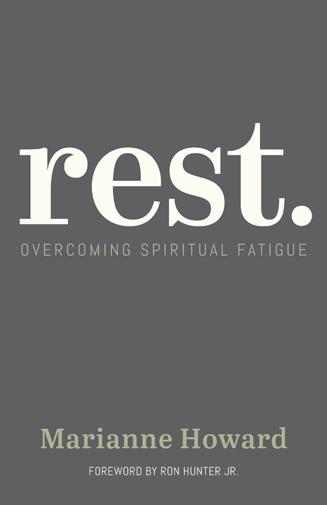
routines and tastes that shape our love for Him. Learning to treasure Jesus in a distracted world takes intentional practice. It’s discipline that pulls the distracted pieces of us back together. Discipline helps us live within our limits. Discipline helps busy people slow down enough to let their souls sink into Jesus. That’s where the real spiritual work is done: the secret place where “deep calls to deep.”
Practice Listening. Do we have the discipline to mute the volume on the numerous voices constantly clamoring for our attention, even as we turn up the volume on God’s voice from Scripture? To move from weariness to rest, God’s Word must occupy a more significant portion of our information diet. Many demands draw our attention; however, we can become people who choose to be still, sit at the Lord’s feet, listen to His voice, be profoundly aware of His presence, and live as close to Him as humanly possible. This is where true rest is found.
Be Intentional. Closing the gap between knowing and doing in our lives means we must develop new


The God of the universe deserves more than a few moments of focus. He deserves our undivided attention and humble willingness to behold Him for who He is. You are never too dry or too empty for God to replenish you completely. He will satisfy the weary soul (Jeremiah 31:25). God’s wells run deep and wide. His resources are unlimited. His grace is sufficient. May your intimacy with Jesus exceed all the ministry madness, busyness, and noise. Your ministry is not your life. Jesus is your life.
About the Author: Marianne Howard’s experience as a minister’s wife allows her to see the toll spiritual fatigue takes on gifted ministry leaders. She is a co-host of the D6 Podcast, regularly contributes to the D6 Family blog, and is a passionate teacher of God’s Word.
Spring 2023 Scope and Sequence








March 5 Called to Holiness (1 Peter 1:1-25)
March 12 Pursuing Holiness (1 Peter 2:1-17)

March 19 Tested in Suffering (1 Peter 4:1-19)
March 26 Return of Christ (Mark 13:1-27)

April 2 Suffering of Christ (Mark 14:32-65)
April 9 Resurrection of Christ (EASTER) (Mark 15:16-16:8)


April 16 Courageous Faith (Esther 3:1-4:17)
April 23 Standing for What Is Right (Daniel 1:1-21)



April 30 Standing Against Idolatry (Daniel 3:1-30)



May 7 Standing Against Opposition (Daniel 6:1-28)
May 14 Principles of Prayer (Matthew 7:7-11; Romans 8:26-27; John 14:13-14)
May 21 Growing in Grace (2 Peter 1:1-21)




May 28 Living in Hope (2 Peter 3:1-18)


To order, call 800-877-7030 or visit www.d6curriculum.com
Curriculum Discipleship Plan
Spring 2023 NEXT Always Only JESUS: Interviewwith BARTMILLARD LivingWhereYouDon'tBelong andPilgrimsSTRANGERS: integrating truth, faith, and life FUSION GOD Helps CHILDRENHis CUDDLE T IME BIB L E STORY B OOK ORGOD•GODHELPSHISCHILDREN SP 23 FOR SUCH A TIME AS THIS: LESSONS FROM ESTHER JESUSAlwaysOnly 13 WEEKS OF DEVOTIONS Drs. Les Leslie Parrott, Holley Gerth, Neil Gilliland, Denny Kuhn, and more! An Interview with Bart Millard funny SPRING2023 god's amazing CREATURES Koalas Features:lves, Baby Squirrels, and Friends: Why Choosing Good Friends Really Matters Live Your Truth Other Lies: Interview with Alisa Childers Human Trafficking: What Every Teen Should Know Tune With God: Discovering the Purpose Prayer 13 Week Study Volume Issue Mar Apr 2023 SP23Forward EasterVersion.indd Be a DI ERENCE MAKER U grace Spring 2023 FOUR FACTS ABOUT DANIEL A a g C e SP23_EG b.indd 3:16

SUNDAY, APRI L 30 AN OFFERING TO SUPPORT THESE VITAL MINISTRIES LEARN MORE: NAFWB.ORG/ TOGETHERWAY BOARD OF RETIREMENT COMMISSIONS | EXECUTIVE OFFICE FWB FOUNDATION | WNAC VERTICAL THREE
WAR in the
BY BRIAN HAYNES
We can’t even imagine how good life was for the first humans. The man and the woman were placed by God in a garden called Eden, literally meaning “paradise.” Everything needed for life flowed perfectly from Eden. Perfect paradise and perfect peace. This first garden was life as it was designed to be lived.
Scripture describes another garden, a garden of shalom This garden is in our future. We aren’t there yet, but we cling to its promise. In the book of Revelation, John described a vision of the future given to him by Jesus. After generations of life in the wilderness, a new day, the Great Day, is accompanied by a second garden with similarities to Eden, only this one is called Yeru Shalayim or “City of Peace.” The New Jerusalem is a perfect city of perfect peace. There, life finally will be as it should be.
Between those two gardens, Eden (Paradise) and New Jerusalem (Peace), there is only the desert, a biblical metaphor for life and the place we are loving and leading our families, spouses, children, and grandchildren. Here, life is not as it should be. We wait between two gardens. We are at war in the wilderness, this desert called life.
The Hebrew language uses three primary words to describe the desert: midbar, t’siyah, and yashiymown . These


words represent three types of deserts, and metaphorically, three types of life-experience most of us navigate during our time walking the planet. The first desert, and perhaps the most livable, is midbar. While midbar can be treacherous if you are inexperienced or lack guidance, you can live there if you know what you are doing. As it compares to life, midbar is basically what we call normal. No, it is not exactly right. It is not as it should be. But, it is about as good as it gets outside the garden of Eden. In a midbar, there is sickness and sin. There is pain. Evil exists. Consequences are real, and you must work to make it, but you can survive the midbar.
The second type of wilderness is t’siyah. You can survive this desert, but only if you have help. This is deeper, darker, hotter, and even more chaotic. You need help to trek this part of life and survive. Here, you encounter moments and seasons full of drought and deep darkness—those times in life when the soul of your family is scorched. We walk this land in life. In the t’siyah parts of life, you can’t survive without help.
However, a third kind of desert awaits in life. Yashiymown is desert you cannot survive—wild, unbearable, and unfit for dwelling. During these moments in life, only the presence of God and a miracle of God will sustain you.
10 | ONE Magazine April-May 2023
Life between the gardens is no walk in the park. While it’s all challenging, some parts are almost impossible. The most important action we can take to lead our families through this war in the wilderness is to cry out to God.
We hear these cries throughout the Word of God. And, when God’s people cry out to Him, He always hears, just like you hear the cry of your own child. He will hear you, too, no matter what desert you face.

New Releases from
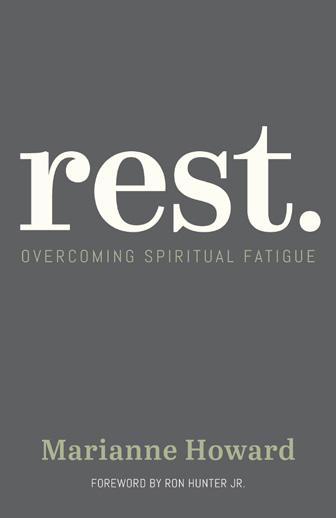
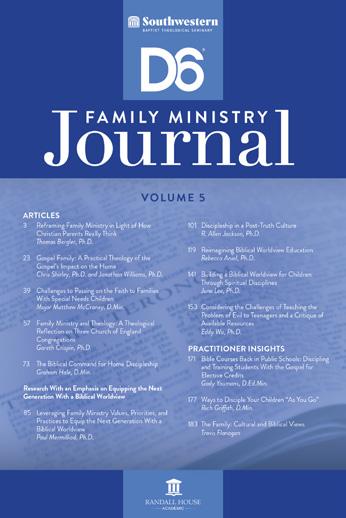
War

by Brian Haynes
ISBN: 9781614841395 $17.99
Adapted from War in the Wilderness: Fight for Your Family When Life Isn’t as It Should Be by Brian Haynes. Read the book to learn about Brian’s journey through Yashiymown, and how God protected and preserved Brian and his family.

About the Author: Brian Haynes serves as Lead Pastor at Bay Area First Baptist Church. He is a graduate of Baylor University, Southwestern Baptist Theological Seminary, and Liberty Baptist Theological Seminary, where he earned a D.Min. in discipleship and family ministry. Order your copy today: warinthewilderness.com.
by Marianne Howard
ISBN: 9781614841432 $15.99

#2 NEW RELEASE ON AMAZON!
Volume 5
NEW App! 30 Days Connecting With the Heart of Your Teen


Available at www.randallhouse.com
Spiritual Fatigue
Rest. Overcoming
D6 Family Ministry Journal
Southwestern
ISBN: 9781614841586 $15.99 in the Wilderness Fight for Your Family When Life Isn’t as It Should Be
#1 NEW RELEASE ON AMAZON!
Intentional GRANDPARENTING
BY JERRY AND BARBARA GIBBS
and pajamas on, we all gather in the boys’ bedroom. Someone asks to read the Bible story. After the story, questions and discussion bounce back and forth. It can get theological in an instant. Prayer time quietens their young minds and reveals a bit of their hearts. Then, perhaps to delay bedtime, someone invariably has one last joke, and the “sillies” return.
Come sit at our supper table during a sleepover evening with some of our favorite people in the world—our grandkids. The knock-knock jokes get sillier as the sloppy joes disappear.
You have heard being a grandparent is awesome. It is! Speaking into the lives of our grandchildren is one of the greatest privileges and blessings we have as grandparents. These moments come in many forms, even through Chuck Norris jokes. After sleepover evenings, with teeth brushed
It is important to create traditions, and sleepovers have become just that. Our pre-Christmas sleepover is a favorite. The grands write their own Christmas stories or draw pictures and decide which song they want to rehearse to sing for the whole family on Christmas Day. One year, they learned to do “Silent Night” in sign language— impressive and moving. Last year, we enjoyed a trumpet solo, a piano solo, and the carol they chose as a group, “O Holy Night.” The ten-year-old wrote a script. It was outstanding and memorable. For Popi and Nana, it was unforgettable.
We are blessed to live close to many of our 11 grandchildren. We attend soccer games, school plays, and music concerts. We try to be there whenever we can to say, “You
“Popi, did you know Chuck Norris is the only person who has counted to infinity twice?”
12 | ONE Magazine April-May 2023
“No, but did you know Chuck Norris can speak Braille?”
did a great job!” or offer a hug and say, “That was a tough game, wasn’t it? Even though you lost, I’m proud of you; you played hard!”
In 3 John 4, John wrote, “I have no greater joy than to hear that my children walk in truth.” If we as grandparents have the same longing to see our children’s children walk in truth, we must be intentional in our words and actions.
As John urges, we must first “follow not that which is evil, but that which is good” (verse 11). Our grandchildren must see goodness and truth in our lives, so they value it in their own. A quick trip to the grocery store with Popi can teach our grandchildren volumes about how to treat people with respect or respond to an angry driver.
We grab intentional moments like jewels, precious as they are. One of those jewels is simply the time we spend listening and asking questions. This intentional listening is a gift to us and them as we learn what is important to them and the troubles they face. Many young ones suffer from the pain of broken homes or blended families. A loving grandparent can offer a neutral ear to burdens weighing heavy on young shoulders. It is important to listen while they are young. Hopefully, as they get older, they will remember and continue to confide in us.
We cherish the moments we spend with the younger ones, but we sometimes fret because we don’t see our three older grandsons, ages 18 (twins) and 22, as often. We sometimes text them individually. Recently, we were disappointed when studies and work kept them from coming for Thanksgiving. We sent them individual cards with a Starbucks gift card, closing with the usual, “We love and pray for you
every day.” Hopefully, one or the other was encouraging to them.
Chuck Norris may be able to count to infinity twice, but he cannot pour out his love on your grandchildren. Only you can do that.
Dear friends and former missionaries to Haiti, Linda and Steve, visited recently. As we chatted about our grandkids, we talked about the need to be intentional in speaking into their lives. Linda gave us a laugh when she told this family story:


During COVID lockdown, we decided to begin serving communion around our dining table following our family service and meal together. Poppy (Steve) led communion and asked questions to various grands. Our son and his wife decided their youngest, four at the time, was old enough to begin having communion with the family. This was his first communion. Everyone was respectful and attentive, even during the reading of a rather long Eucharist passage beginning, “On this special day, we wish to remember what our Lord Jesus told us to do until He returns again….” Then Poppy led us through Communion. The four-year-old, not raised on juices, typically drank either milk or water. So, this was his first swallow of grape juice. As we somberly drank the juice, out of the silence we heard a bright, astonished voice, “Cheez Louise, that was good!”
What a moment to remember! May God give us as grandparents those moments to recall and cherish as we strive to leave a spiritual legacy to our children and their children and their children and their children...
About the Author: Longtime missionaries to France Jerry and Barbara Gibbs currently serve as development associates with IM, Inc., working closely with Go Global conferences. Learn more: iminc.org.
Great Ways to Grandparent INTENTIONALLY
1. Create traditions. 2. Be present, if possible. 3. Celebrate victories and commiserate with losses. 4. Listen well. 5. Pray for and with grandkids. 6. Connect with distant grandchildren (cards, text messages, gift cards). ONE Magazine April-May 2023 | 13
Thriving in Multicultural Soil
BY JACK AND ASHLEY KETTEMAN
The night we arrived back in the States after two and a half years in Japan, our family of five walked from our gate toward the airport lobby and were warmly welcomed by familiar faces. After these kind people helped us collect our (many) bags, we had a rude awakening. A long line of cars waited for thousands of other travelers, raising tensions and bringing tempers to a boil. When some unkind words were directed toward us, our daughter said, “Let’s turn around and go back right now! We’ve already got our suitcases with us.”
Welcome back, indeed! Despite the excitement of seeing family and friends, and even with the joyful prospect of long-awaited time with grandparents, the shock of American rudeness was almost enough to make our kids want to turn around and make the 13-hour flight back to Japan.
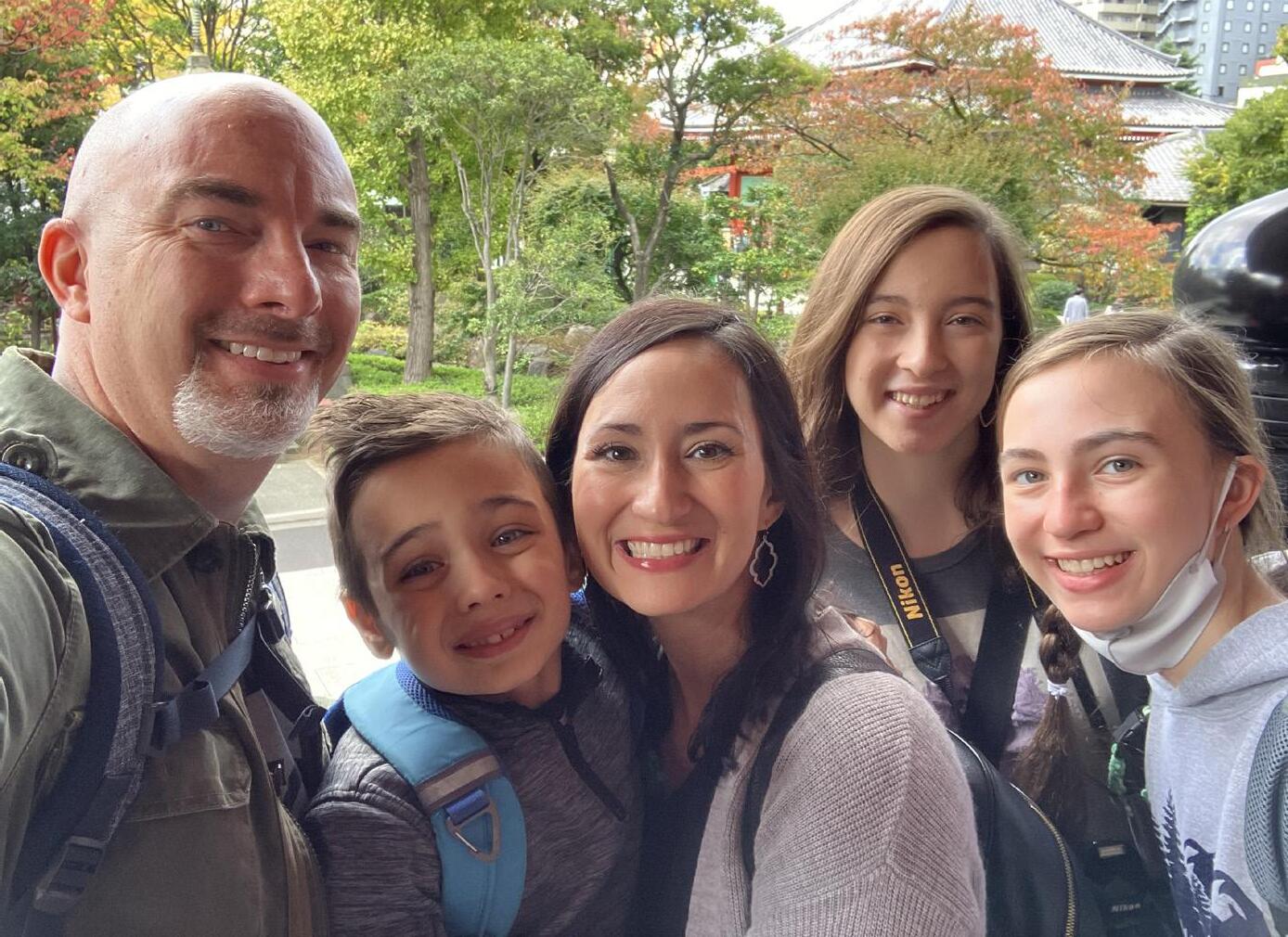
We’ve been asked to address raising missionary kids and helping them navigate between two cultures—neither culture a perfect fit. Two disclaimers: first, we are still new to this after only four years of living cross-culturally, and second, we are not experts…in anything. When our kids succeed at coping with living in two worlds (or anything else, for that matter), it is a result of God’s grace. As we share these thoughts and experiences—some learned from others—we do so with gratitude for the Lord’s faithfulness during these years of major transition for our kids. We have learned the following things about raising missionary/third culture kids during the “steep learning curve” of the last few years.
Without question, the most significant need and gift has been prayer for our kids. Not just from us, but from grandparents and family members, church family and ministry partners in the States and around the world—all covering our children in prayer and inviting God to work on their behalf.
Our story is somewhat different because we were called to Japan when our oldest was starting middle school. Both of our daughters recall specific moments when they knew the Lord wanted them in Japan, too. They are quick to serve because they know they are needed, and their ministry is valuable to the Kingdom. They know they are part of our ministry and the ministry of the Hope Alive team.

Some families attend our church now because of our kids’ friendships. Our girls participate in praise band, assist in outreach events, teach kids’ classes, and watch staff members’ children during events. Our young son Carter even joined in with them to help demo and remodel at church. Living as an obvious minority in a culture with so few Christians helps them see how necessary their witness is.
One of the attitudes adopted early on was the “going on an adventure with God” mindset. We took advantage of opportunities to explore our new country, finding interesting shops and yummy restaurants. When we returned to the States last summer, we
14 | ONE Magazine April-May 2023
also made sure to visit our favorite spots. We took the kids on our travels, visiting new places and seeing a wide variety of subcultures and landscapes unique to the U.S. We try to appreciate and love the nuances of each culture. For instance, our family enjoys the quiet respect and dignity of Japan, but we also love the freedom, comfort, and friendliness of the U.S. Our kids love gobbling up sushi in Japan and digging into comfort food at grandparents’ tables in the U.S. They enjoy navigating trains in Japan and riding four-wheelers in the States. Our daughters Jane and Callie (ages 15 and 12) experience increased independence in Japan. It’s such a safe place with convenient public transportation. On the other hand, our son Carter (seven) woke up the first day back in the States and asked, “Can I go outside and play?” We replied with a hearty, “Yes!” It was so freeing to have a yard again, with real grass for outdoor play.
Overall, our cross-cultural life has been incredibly positive. Still, we experience frustrations in both cultures. In Japan, many times we think, “Don’t they realize there’s a simpler way to do this?” In the States, we sometimes wish people knew “the Japanese way” to work with dignity or excellence. Our pre-field training at CIT (Center for Intercultural Training) taught us that these and other similar cultural variants should not be considered weird, just different.
Sometimes, our kids feel the need to defend one culture or the other to people who don’t understand. Callie was upset when classmates in Japan listed guns and drugs as the primary global exports from America. We sent her back the next day armed (no pun intended) with a list of helpful exports from her native land. However, during travels in the States, our kids find similarly wrong perceptions about Japan among American children. Though unfortunate, these instances often have become opportunities to help others understand and have helped solidify our kids’ appreciation of both cultures.
The IM family has been a huge help in our kids’ adjust-

ments between cultures (both stateside and on the field in Japan). They also draw support from friendships and mentors at CIT who can relate to them and from the CAJ (Christian Academy in Japan) community where they attend school. Before Hope Alive began, a pastor told our team planting a church together would allow people to see the “one anothers” of Scripture lived out in the Body of Christ. There is no replacement for our families in the States. But we have found Jesus’ words in Mark 10:2930 true: leaving family, home, and country to serve Him yields hundreds of blessings—now and eternally.
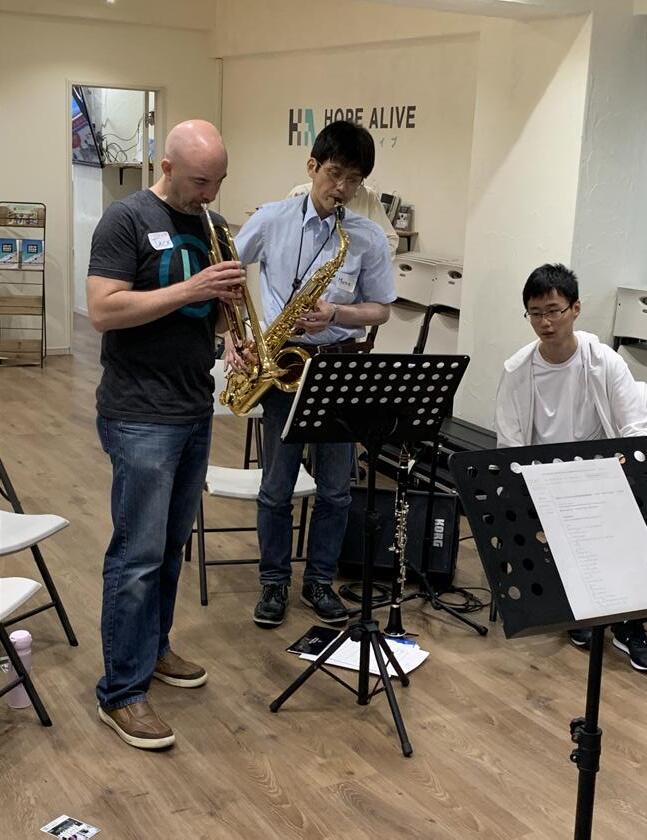
Our ultimate goal for our kids is not assimilation into Japanese culture (or American culture, for that matter)— it is conformity to the image of Christ. In an early conversation with our team leaders, we received a great reminder. Our children’s spiritual and emotional health is more important than their language fluency. More than anything (speaking the language, blending in, learning “the Japanese way,” being “normal” Americans), we want our children to know and love Jesus and have a personal relationship with Him. He is enough.
Being third culture kids has shaped our children’s views of immigrants. They understand how it feels to be an “outsider,” what it’s like not to understand the language, the discomfort of being the object of stares, and the confusion of not knowing how to act in certain situations. These
ONE Magazine April-May 2023 | 15
Our ultimate goal for our kids is not assimilation into Japanese culture (or American culture, for that matter)—it is conformity to the image of Christ.
challenges and others help them remember our citizenship is in Heaven (Philippians 3:20). We make a point to recognize God’s hand regularly and make Christ the most central part of our daily lives. We pray together for lost friends, thank God for daily gifts and prayers being answered, and thank God for partners who give sacrificially to make it possible for us to serve in Japan. We discuss our kids’ doubts and their friends’ beliefs in false gods.
It has been a refreshing and meaningful reminder to realize Jesus was a third culture kid, too. After leaving His perfect home in Heaven, He was born in Bethlehem, lived in Egypt, grew up in Galilee, and ministered throughout Judea and Samaria. (Consider Sara Saunders’ book Swirly as an outstanding resource.) Jesus understands the challenges our children face: being outsiders, lonely, and
separated from family. Through all these challenges, they can understand Him more.
A quote hangs on our wall: “Home is where our family is.” While that is true on earth, regardless of our address, it is even more true that our ultimate home is Heaven. There, we truly will belong and “fit in.” Until then, we continue to pray our kids will live for Christ and thrive in the multicultural soil in which they’ve been planted.
About the Author: Jack and Ashley Ketteman recently returned to Japan as career missionaries after completing a two-year internship in greater Tokyo as members of the Hope Alive church-planting team. Hope Alive is a bilingual church in Tokorozawa. Learn more: iminc.org.


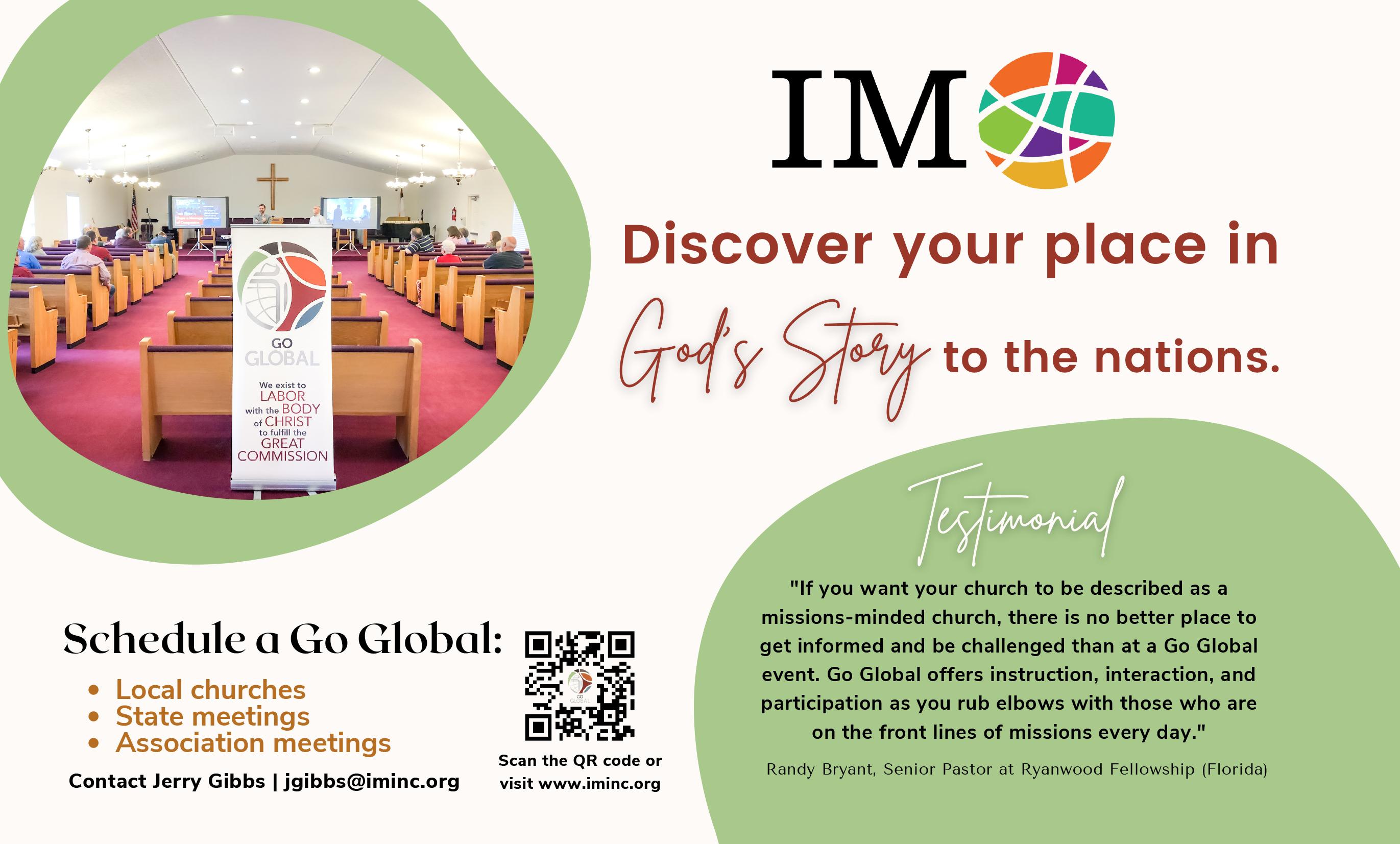
Discipled by
BY TOM DOOLEY AND BETHANY DOUGLAS



When we hear about the biblical figure Daniel, lions usually come to mind. However, the book of Daniel contains much more than Daniel in the lions’ den. Long before the lions, the first chapter describes a time of spiritual failure and catastrophic change for the people of Judah. If we study this chapter closely, Daniel reaches across the centuries to disciple readers, offering valuable lessons about honoring God in dark times and difficult places.
Spiritual Failure

(Daniel 1:1-2)
The spiritual failure in Judah began at the top with King Jehoiakim. The 18th king of Judah, Jehoiakim began ruling at age 25 and continued 11 years (2 Kings 23:36). According to 2 Kings 23:37, King Jehoiakim lived an evil life. How would you like the Lord to look at your life and conclude, “He did that which was evil in the sight of the Lord”?
What evil did he do? Jehoiakim worshipped Baal and the pagan gods of the East. He encouraged his people to turn away from the true God and join him in idolatry. He failed to lead his subjects in the way of the Lord. God responded with judgment. He allowed Nebuchadnezzar, king of Babylon, to overthrow Jerusalem and seize control of Judah. These events offer a serious warning. We cannot get away with sin. God warned His people, but the warnings went unheeded and God acted to discipline His wayward children.
Catastrophic Context (Daniel

1:3)
The resulting judgment was catastrophic for God’s people, including Daniel. He lost his family, his home and culture, and even his name. I’m sure his boyhood dreams faded quickly, like the morning mist. Because of Judah’s disobedience, even faithful Daniel spent the rest of his life in a
foreign land serving pagan kings. Within this catastrophic context, Daniel and his friends faced a great test. Would they remain faithful in Babylon?
Faithful Response (Daniel 1:8-14)
Notice the faithful response by Daniel and his three friends. When selected for training to serve the king of Babylon, they determined to honor the Lord in all things. The captives selected for the king’s service—let’s call them “trainees”—were to be given special names, educated as Babylonians, and fed a Babylonian diet.
Daniel quietly spoke to their overseer Melzar, and told him, “We prefer not to eat the food or drink the wine the king has selected for us.” The request did not go over too well, for Melzar feared the king. He knew if anything went


ONE Magazine April-May 2023 | 17
wrong, it could cost his life. In response, Daniel requested Melzar to allow him and his friends a diet of vegetables and water for a ten-day trial period. If Melzar wasn’t pleased with their progress, he could then do with them as he pleased. Melzar consented.





Notice Daniel said nothing about losing his Hebrew name. He did not object to the Babylonian education. But when it came to the diet, Daniel drew a line. Why? Because God had given His people clear and specific dietary instructions. Daniel knew the diet suggested by the king required disobedience to God’s commands.
What a great example. While some cultural adaptation may not be harmful in our spiritual lives, believers must draw the line when the Word of God is clearly violated. We must honor the Lord, even when compromising His commands—even a little—seems easier. What kept Daniel and his friends from compromising?
God’s Word in Their Hearts
How did God’s law get instilled in the hearts of these young Hebrew men? Most Bible scholars believe Daniel and his friends were a quartet of captive 15-year-olds who chose to obey God’s dietary standards. But how did they know God’s dietary laws? We are not told in Scripture, but likely they learned the laws from godly parents who themselves refused to compromise with idolatry, and who taught their sons to obey God and His commands. Parents today are still responsible to pass God’s Word to their children, to disciple and teach them to love God and live faithfully.
To live faithfully, it is crucial for the Word of God to be hidden in the heart of every believer. Our minds should be bathed in scriptural truth, so when we face temptation, we can draw upon the reservoir of God’s Word in our hearts, enabling us to resist sin. Daniel knew God’s law, and it gave him strength to be faithful.
Choice to Obey
Daniel understood the cost of sin, and he refused to be defiled. The word defiled means “made unclean.” Daniel did not want to be unclean in the sight of God. He knew he would be defiled if he compromised, so he chose to honor the Lord no matter what. He made the right choice in a tough situation. He demonstrated one of the keys to surviving difficult situations: choosing ahead of time—before temptation—to do what is right.
Because Daniel chose to honor the Lord, he experienced the blessing of the Lord upon his life. Scripture teaches the Lord honors those who honor Him (1 Samuel 2:30). Don’t get me wrong. God did not take Daniel out of Babylon; He blessed him in Babylon. He did not take him from the catastrophic situation but allowed his life to glorify God through the difficulty.
After ten days, Daniel and his friends looked so much better than the other trainees, Melzar decided to switch everyone to their God-honoring diet (Daniel 1:15-16). And God’s blessing went beyond the physical. God also blessed these faithful young men with a special capacity to learn and granted them wisdom far beyond their years (Daniel 1:17-20). Later, when the king evaluated them, they were far superior to all the other trainees.
Will you be faithful?
Babylon was a real, historical city but is also symbolic of a place we don’t want to be. Sometimes, God allows us to endure difficult places in our lives, whether the result of His discipline, the fallen nature of our world, or the consequences of our own choices. Perhaps your “Babylon” is a financial crisis, a relational difficulty, a crumbling marriage, or a serious health problem. You don’t want to be there, but you are. Will you be faithful?
To remain faithful in Babylon, we must learn from Daniel and choose to honor God in everything. Then, and only then, will we experience what Daniel experienced—the Lord’s blessing in a difficult place.
Adapted from Taming Life’s Lions by Tom Dooley, a Direction Bible Study. Learn more: fwbmastersmen.org.
About the Author: Bethany Douglas is an administrative assistant at North American Ministries. Previously, she and her husband Thaddaeus served at the Free Will Baptist School in St. Croix, USVI. A Welch College graduate, she recently received a M.A. in English Literature from Murray State University.
18 | ONE Magazine April-May 2023
PRIMARY SOURCE
A Pair of Pigtails
BY PAUL V. HARRISON
Proverbs 18:22: “Whoso findeth a wife findeth a good thing.”
Sixteen-year-old Katherine stood before witnesses and promised God a life of virginity. Six years later, she wondered if her vow had been a mistake. Martin Luther’s writings, spreading like wildfire, flamed up in the heart of this young German nun, prompting her to question the direction of her life. So, she and others from her convent wrote the reformer at Wittenberg, asking for advice. He suggested they abandon their vows, escape the nunnery, and find husbands or engage in some noble endeavor. Though execution sometimes resulted from such escape attempts, the women accepted the risk and hatched a plot.

Luther’s friend Leonard Kopp sometimes delivered barrels of smoked herring to the convent in Nimschen. He made a delivery the night before Easter 1523. When Kopp drove the wagon away from the village, Katherine and eight other nuns were tucked away under the canopy. By Tuesday, the wagonful of women rolled into Wittenberg.
Though an attractive woman, Katherine was still unattached two years later, despite Luther’s efforts to find her a husband. Denmark’s king flirted with her, even gave her a ring, but nothing came of it. Another young noble sought her hand but changed his mind when his parents objected. Undaunted, the reformer kept playing matchmaker. The former nun finally responded by expressing interest in Luther himself.
Sixteen years her senior, Luther also had taken vows of celibacy. But part of the Catholic tradition he had shaken off was the ministerial requirement to remain single. His teaching prompted other priests to marry, and some had suggested he back up his words by taking a wife himself. He was uninterested in marriage, he told one correspondent, “not because I am a sexless log or stone, but because I expect daily the death of a heretic.”
Yet, there he was, encouraging others to take the step of matrimony he himself was unwilling to take. A Christian lady admitting interest in him only increased the pressure.
The former monk and former nun married June 13, 1525. Reflecting on his early days of marriage, he described waking to “a pair of pigtails lying beside him.” Though romance hadn’t prompted their union, it quickly blossomed. He playfully called her “Lord Katie,” and she dubbed him “Herr Doktor.” In a letter to a friend, he wrote: “I and my rib send greetings to you and your rib.” The couple rejoiced over six children. They wept over the graves of two.
Katherine offered great encouragement to Luther who, prone to melancholy, sometimes fell into spiritual quagmires. Once, when he had locked himself in a room for three days, she took off the door to lift him from his slough of despond. She planted, reaped, cooked, brewed, doctored, and hosted anyone Martin brought home. She also sparred with him theologically, once asking, “How could David say, ‘Judge me according to my righteousness,’ when he didn’t have any?”
After her husband’s death, Katherine lived only four years, dying December 20, 1550. Her final words were: “I will stick to Christ as a burr to a top coat.” 1
About the Columnist: Paul V. Harrison has pastored Madison FWB Church in Madison, Alabama since 2015. Previously, he pastored Cross Timbers FWB church in Nashville, Tennessee, for 22 years. He was an adjunct professor at Welch College for 17 years, teaching church history and Greek. Paul is the creator of Classic Sermon Index, a subscription-based online index of over 66,000 sermons, with clients including Harvard, Baylor, and Vanderbilt, among others: classicsermonindex.com.
1 Many historical details in this column were taken from Roland Bainton’s Women of the Reformation in Germany and Italy (Boston: Beacon, 1971).
Katherine (von Bora) Luther
ONE Magazine April-May 2023 | 19
Image : Wiki Commons
the
 BY RUTH MCDONALD
BY RUTH MCDONALD
She sometimes wants to say no, but the Lord keeps saying yes. She is an introvert, but the Spirit continually leads her into new and uncomfortable relationships. She thinks she’s too old, but God obviously still has work for her to do. So, she continues to listen to His voice and follow His leading just as she’s always done.
Lorene Miley recently celebrated her 95th birthday by telling her family that “people this old should not still be here on earth.” When listening to one Christian speaker recently, she reportedly remarked, “He really should retire from public ministry because his voice is not pleasant to listen to anymore.” She declines invitations to speak for this same reason.
When asked to speak at the Welch College Missions Conference recently, she answered with a firm “no.” She cited her age, quavering voice, and declining eyesight. Two days later, she called back and accepted, stating that God had told her to do so. The resulting panel with missionary women of all ages was a blessing to all who heard it.
She admits that, apparently, God still had some things He wanted her to say. As long as He wills, she is willing.
Perhaps best known for her decades as a pioneer missionary in Ivory Coast, West Africa, with her doctor husband, Laverne, Lorene has never stopped obeying Christ’s
Discipleship PUZZLESolving of 20 | ONE Magazine April-May 2023
command to make disciples. She is a skilled teacher, public speaker, Bible scholar, counselor, and mentor to women representing many generations. More than anything else, she is a disciple of Christ herself. When the subject of intergenerational discipleship arises, she is the first example who comes to my mind.
Yet, Mrs. Miley doesn’t see herself that way. “I never thought of myself as a mentor. I only formally mentored one person, and I still pray for her. Neither do I feel I have the spiritual gift of mentoring. Perhaps God just surprised me with His blessing from time to time.”
Those who know her best emphasize she is a natural introvert who seldom initiates relationships. Even though she has not intentionally made it her goal to mentor or disciple across generations, scores of women look to her as a life-changing presence. As Mrs. Miley continues her “long obedience in the same direction,” God sends people to her.
Tina Tolbert (age 63) is a long-time follower of Christ and a professor at Welch College. Like most Free Will Baptists, she had heard of the Mileys her whole life. During her college days, she began attending Cofer’s Chapel with the Mileys and occasionally ate lunch at their home. “This is when I began to know her on a more personal level,” Tina recalls. “I clearly remember noticing her as a great person and a beautiful, godly example of striving to live in full pursuit of God’s direction in life.” Hollie Hubbard Casper (age 40) ministers alongside her husband Jason to international students in New York City. Like Tina, she attended church with Mrs. Miley as a Bible college student and often visited her home for meals. She later worked and ministered with Mrs. Miley at the Hephzibah House, a Christian guest house across from NYC’s Central Park.
Hollie treasures “the memories of visiting her room, hearing another story from her life experience, asking for her advice and gleaning from her wisdom. Usually, before I left, she would pray for me and whatever I needed in that moment. Even now, I am challenged by her example of a heart hungry for God and her desire to keep studying His Word and learning more.”
Elizabeth Snow (age 30) is a follower of Christ and a physical therapist living in East Tennessee. She was invited to the home of Clint and Lynette Morgan (Mrs. Miley’s daughter and son-in-law) after she participated in a shortterm mission trip to Africa. As they talked, they discovered a shared love for jigsaw puzzles. The simple hobby became their connecting point. They would spread out a puzzle on Mrs. Miley’s kitchen table and work on it until it was done, a feat that usually required multiple visits.
“I think I was the one who pursued her,” Elizabeth recalls. “But, because of who she is, she just drew me in, and in turn, I think she pursued me, too. She definitely invested in me while I was there, making the most of every visit. She always took the time to be intentional with our time together. We had many conversations that included analogies about how our lives compare to puzzles: how the pieces don’t seem to fit like we thought they would; how we need a biblical foundation (the border); and how you can never force a piece to work where it is not meant to be.”
Lynette Miley Morgan notes young women gravitate toward her mother. Her mom is not usually the instigator of these mentoring relationships, although there are exceptions to this pattern. When Mrs. Miley senses someone around her needs to hear truth, she is bold and assertive in pursuing them. Her intimate, daily walk with the Lord allows her to hear the direction of the Holy Spirit clearly as He directs her to those with spiritual needs. This lifelong commitment to obeying His call has led to some of her more unlikely relationships.
Among those she currently disciples are a Catholic walking partner, a pen pal in a women’s prison, an office worker struggling through difficulties, and several others with whom she does weekly Bible studies. She prays daily for God to take her home to Heaven, but she will not quit serving Him until He does.
Mrs. Miley recently told me, “My dad lived with us the last years of his life. I remember him often saying, ‘Everyone I know is already in heaven.’ How sad. Perhaps I was subconsciously drawn to younger women because, when I got old, my younger friends would still be around. Today, I am blessed beyond measure. I have lots of friends, many younger spiritual ones, and a host of others just waiting to

ONE Magazine April-May 2023 | 21
rekindle that dear relationship in Heaven. Even so, come Lord Jesus.”
Women mentoring women has become a hot topic over the past few years. Much of the information available on the topic relates to career women seeking mentors in the workplace. Young women in Generation Z are eager to learn from their older bosses and coworkers as they enter their careers. Unfortunately, many of the voices they hear are not founded in the biblical principles of godly womanhood. As Christian women, we are commissioned to mentor across generations in the Body of Christ.
Dr. Sarah Bracey, a Christian and a counselor of collegeaged girls at Welch College, recently shared that young women desire to be mentored by older ones. Although they can easily find a video online about how to make an apple pie, they overwhelmingly say they would choose to spend an afternoon actually making an apple pie with an older woman.
I asked Mrs. Miley for advice regarding mentoring and discipling across generations. She replied, “I wouldn’t have any advice to give; that’s what experts do, and I don’t qualify there. However, for any task God calls you to, four attributes are necessary: intimacy with Jesus, a clean moral life, love for people, and being available.”
Through 95 years of life (and counting) Mrs. Miley has done those things well. She invites younger women into her daily life, following the example of Jesus, who became flesh so humanity could see, hear, and touch God.
In Africa, she taught women to sew. In New York City, Arizona, and Nashville, she invited them (and continues to invite them) into her home. She joins them on daily walks, does jigsaw puzzles with them, and plays board games. She goes beyond speaking truth from a podium. She eats, laughs, and fellowships with them as well.
“The life she lives is an authentic, genuine portrait of application of Truth,” says Tina. “Of all the examples of living she has provided me, of all the ways she has impacted my life, this is the most significant.…I have seen her offer her kind spirit, kind words, and friendship to people from college to far, far beyond. One college girl would say Mrs. Miley’s friendship and guidance changed the course of her life. A senior citizen named Mrs. Miley as her biggest Thanksgiving blessing after relocating to a new place. I am somewhere between those two age groups, and she has had a tremendous impact on my own life as well.”
Each lady I interviewed emphatically shared how Mrs. Miley had blessed them. Each treasures memories of their times together that will last a lifetime.
Hollie writes, “Mrs. Miley is one of the most fun-loving, fearless women I’ve ever met. She often set out early in the morning to explore a new corner of New York City, often riding the train to the end of its line, getting out to explore the neighborhood where it stopped, grabbing a bite to eat, and then returning home to report what she had found. On one of my first days in the city, she took me to ride the ferry so I could see the Statue of Liberty. After we boarded the train, she realized we were in the back of the train and needed to be in the front because the train would split at a certain point. She told me, ‘When the train stops, we need to jump out and run!’ That’s exactly what we did. We made up a few cars at each stop, jumping back on the train before the doors closed. Finally, she was satisfied we were close enough to the front to make our stop. She is always up for an adventure and made my first year in NYC so much fun!”
This story is made even more amazing when you consider that Mrs. Miley was well into her 70s at the time. The Hephzibah House, where she was working at the time, is a five-story brownstone built in the 1800s, and without an elevator, but she energetically and routinely climbed the winding staircase as part of her duties.
Tina Tolbert offers a parting thought: “By the way, if ever she invites you to take a walk with her, give it considerable thought. She means business! She takes her walking seriously, and she is not easy to keep up with. Even in walking, she has taught me a thing or two.”
“She always beats me in SkipBo,” says Elizabeth Snow. “Every single time!”
About the Author: After serving as a missionary in Japan for almost four decades, Ruth McDonald became the director of WNAC in late 2022. Learn more: wnac.org.
22 | ONE Magazine April-May 2023
“For any task God calls you to, four attributes are necessary: intimacy with Jesus, a clean moral life, love for people, and being available.”
RECIPE LIFE for
Ten Reasons for a Family Altar
1. It will sweeten home life and enrich home relationships as nothing else can.
2. It will dissolve misunderstandings and relieve all friction that enter the home.
3. It will hold our children to the Christian ideal and determine their lasting welfare.
4. It will send us to work for the day, whether school, home, office, store, or factory, determined to do our best and to glorify God.
5. It will give strength to meet bravely any disappointments and adversities that arise.
6. It will make us conscious throughout the day of the attending presence of our Friend and Helper.
7. It will hallow our friendships with guests in our homes.
8. It will reinforce the influence and work of the church, the Sunday School, and agencies helping to establish the Christian ideal throughout the world.
9. It will encourage other homes to make a place for the church.
10. It will honor our Father above and express our gratitude for His mercy and blessing.
COUNTRY BEEF PIE
THE CRUST:
½ cup of tomato sauce
½ cup bread crumbs
1 lb. ground beef
¼ cup chopped onion
¼ cup chopped green pepper
1 ½ teaspoons salt
1/8 teaspoon oregano
1/8 teaspoon pepper
THE FILLING:
1 1/3 cups Minute Rice
½ cup water
1 ½ cups tomato sauce
1 cup grated cheddar cheese
½ teaspoon salt
Combine ingredients and mix well. Pat meat mixture into the bottom and pinch 1-inch flutings around the edges of greased 9-inch pie plate. Combine Minute Rice, tomato sauce, salt water, and ¼ cup cheese. Spoon rice mixture into meat shell. Cover with aluminum foil. Bake in a moderate oven (350 degrees) for 25 minutes. Uncover and sprinkle top with remaining cheese. Return to oven and bake uncovered for 10 to 15 minutes longer. Cut into pie-shaped pieces.
MEAL PLAN
Country Beef Pie
Pineapple Salad
Iced Tea Bread
Canned Peaches
French Toast and Eggs
Read the entire article: onemag.org/recipe109.htm
About the Author: Mrs. Jim McLain (Nashville, Tennessee). Wife of Rev. Jim McLain; Mother of one child; Christian 23 years; Favorite verse: Matthew 6:33.
ONE Magazine April-May 2023 | 23
A “Blanket Statement”
Uncovered
BY FRANK WEBSTER
“Blanket statements” are things we say to communicate a broad viewpoint or provide a generalized description of people, places, or things. The problem with blanket statements is they sometimes are used to cover something that doesn’t need covering. Here is a personal story to explain further.
My wife Debbie and I live and minister in a retirement community in central Florida. It is the most unique culture we have ever experienced. Our neighborhood has over 1,600 homes, yet we all live and play together in common areas within our community. We have our own meeting place for a wide variety of gatherings, with adjacent gym, pickleball courts, sand volleyball, horseshoes, and more. (We also hold our weekly Connect Bible Study there.) In addition to all that, our community has its own social media platform called E-Neighbors, which is where this story really starts.
One day in December, I received a call from a prominent lady in the community whom I have visited often to talk about a variety of topics, including our church planting effort. Sheri asked me to go with her to visit an elderly couple with ongoing health issues who complain a lot about our community on E-Neighbors. Their complaints typically aren’t valid, but when did the truth ever hamper a good complaint?
We set a time for our visit and drove our golf carts over to their home. With prayer and flowers in hand, we were prepared to be kind in the face of unkindness. At the first knock and ring of the doorbell, three small dogs joined in, alerting their owners someone was at the door. The couple could see us through the door, yet they just sat in their recliners staring at us. After a second push of the doorbell to make it clear we weren’t leaving, the missus slowly got up and made her way to the door.

24 | ONE Magazine April-May 2023
She didn’t seem impressed we were there, but we shared through the partially opened glass door that we hoped they would enjoy the flowers and realize there are friendly people in Spruce Creek. We smiled and wished them well, knowing we had gone as far as this visit would allow.


“Okay. Thank you,” was the only response before the door slowly closed.

We looked at each other and said, “Well, we gave it a shot.”

To our surprise, the couple posted a kind word about two unknown people who brought them flowers. Saying something nice on E-Neighbors might have been a first for them. I’m not exaggerating that statement because it was the hot topic of discussion on the pickleball courts the next morning. “Did you see that the Colemans complimented someone yesterday? That never happens!”
When I joined the discussion, I revealed that Sheri and I were the visitors and described the weird interaction. A kind-hearted guy from New York responded, “You just can’t help people like that!”

Blanket Statement Alert!
Now, be honest. You might have said the same thing, right? I admit I have said similar things in the past, but this time the Lord stepped in and gave me better words: “Jesus teaches that if you love only those who love you back, what good is it? But if you love those who don’t love you back, you are loving as God loves.”
I could tell from the facial expressions of the three other guys that they heard the lesson. All four of us heard it. The Lord used this odd situation to chip away at some hard hearts. Later, a group of carolers stopped by their house, and they reported singing to smiling faces. It seems you can do something to help people like this.
So, am I saying to avoid all “blanket statements”? I’m not sure it would be possible. However, let’s determine to avoid excuses that keep us from being kind to the unkind. After all, we all know that other familiar blanket statement: “killing with kindness promotes life.”
Sure you do! It may not be a mansion, but if you own a house, a car, or even have a bank account, you have an estate. And, you need a plan to protect it. Since 2013, FWB Foundation & Cornerstone Estate Planning have helped thousands of families prepare for their futures. So, find the peace of mind that comes from knowing your estate is ready...even if it's not a mansion.
...but
don't
an
Free Will Baptist Foundation: 877-336-7575 | fwbgifts.com
I
have
estate!
About the Author: Frank Webster and his wife Debbie are joint project workers with the Florida State Mission Board and North American Ministries. Learn more: www.fwbnam.com.
Grounded!
PREPARING YOUR TEEN FOR THE REAL FINANCIAL WORLD
BY CHRIS COMPTON
One of my earliest money memories revolved around tax time. Most people despise tax time, but for our family, it meant something special. Every year, when my parents received the tax refund check in the mail, they took us out to eat at a nice restaurant. We didn’t get to eat out often, so it was a highlight for our family. The good food was great, but the financial lessons I learned were better…and lasting. This simple family tradition taught me the importance of savings goals, delayed gratification, and living within my means, among others. These lessons prepared me for the day I had to make financial decisions on my own.
It is important to begin teaching children about money while they are young, even as early as three years old. It is even more important to share these lessons as they get older, especially when they become teenagers. Many teens have some basic understanding about money and finances. Some may even think they are experts on the topic. Perhaps they understand you must work to earn money, it takes money to pay bills, and saving money is important. If they understand these things, they are headed in the right direction.
However, teens have much more to learn about money. As they get older, the stakes become higher. Into college and beyond, they will encounter some of the most important financial decisions they will ever make. As they grow into young adults, you can and need to help them learn how to manage their own finances well.
Not sure where to start? Consider four basic financial principles every teen needs to know:

MONEY COMES FROM HARD WORK. One of the first lessons teens need to learn is money comes from working. An allowance for younger kids is fine. As they get older, perhaps give them more advanced chores for their allowance to teach them the relationship between hard work and getting paid. Encourage older teens to get a summer job and earn a paycheck. Whatever course you choose, it is crucial for them to learn not to expect handouts.
Seize the opportunity to teach teens about their first paycheck. You can be sure they will be counting down the days to the first check. If they are unprepared for what the check will look like, they may be sorely disappointed. Teach your teen the difference between gross pay and net pay. Let them know in advance money is deducted for taxes. Teach them about the various taxes withheld (Federal Income tax, Social Security tax, Medicare tax, and state taxes) and the why behind taxes. This will help them prepare a budget based on the actual amount they will receive, not gross income.
GIVING IS A BLESSING AND RESPONSIBILITY. Parents should model giving, teach our children the importance of giving a portion of everything they earn, and express the joy found in giving. Teach teens to tithe from their very first job and paycheck. Explain why you give, how important it is, and the direct connection between giving and
26 | ONE Magazine April-May 2023
faith. Teaching your child to have a generous heart is one of the greatest lessons—and gifts—you can share with them.
SAVING HAS GREAT BENEFITS. It may be tempting for some teens to spend every dollar. However, it is crucial for them to learn about delayed gratification, that you can’t get everything you want right away. Help them develop savings goals. Open a savings account for them and let them save towards those goals. These early goals will help them when bigger goals come into view: paying for college, purchasing a vehicle, or buying a house.
Short-term savings teaches them about long-term savings in the future, like retirement. It is never too early to start preparing for retirement, and a Roth IRA is a great place for a teen to start preparing for the distant future.
SPEND AND TRACK MONEY WISELY. Teaching your teen to track spending can be an eye-opening experience…for both of you. Once teens see where their hardearned money is going, you can help them create a simple budget. These early budgets do not need to be complicated. Simply teach them to list their income and their expenses (giving, saving, bills, and more). This will help them from overspending on wants and prepare them for
making tougher financial decisions as adults.
Teaching teens about money is a process. These four financial lessons are good first steps. After they have a good handle on these principles, venture into other important areas: the power of compound interest, managing debt and its potential consequences, a good credit score and why it matters, how big loans affect your life, credit card usage, etc.
Teaching teens about money doesn’t follow a prescribed formula. But teaching your child to handle money responsibly is an imperative. So, find the ways that work for you and your kids. Start young to help them build good money habits and ground them for the real world. The more you interact on this important subject, the easier it will be to talk seriously to them about their financial futures. Your goal is to help create a roadmap leading them to a lifetime of handling money responsibly.
About the Author: Chris Compton is accounting administrator for the Board of Retirement. He graduated in 2007 with an M.A. in Bible exposition from Columbia International University. A 1998 graduate of East Tennessee State University, he has over 18 years of administrative/financial experience in varied fields and seven years in pastoral ministry.
Strong Roots = Great Fruit

Most of us want to impact others for Christ long after we have retired from our life's work. If we plant a faithful financial plan, we will enjoy a bountiful harvest that will enable us to continue blessing others in our retirement years. To plant these financial seeds towards a thriving retirement, contact us today. Let us help you prepare for your future ministry!
BoardofRetirement.com
to the of Theological Youth Ministry
BY CHRIS TALBOT
Youth ministry has experienced a significant shift over the past two decades. It has become more theological and thoughtful, as demonstrated by organizations and podcasts like the Youth Pastor Theologian, Rooted Ministry, D6 Academic, and Youth Ministry Institute at New Orleans Baptist Theological Seminary.
One could also point to books such as Dean Borgman’s Foundations for Youth Ministry: Theological Engagement with the Teen Life and Culture, Mike McGarry’s Biblical Theology of Youth, Kendra Creasy Dean and Andrew Root’s The Theological Turn in Youth Ministry, or Gospel-Centered Youth Ministry put out by The Gospel Coalition. Academic journals are taking this ministry seriously, from the Journal of Baptist Theology and Ministry and the Journal of Youth and Theology to the Journal of Youth Ministry. Moreover, institutes for youth ministry have been established at institutions such as Fuller Seminary, Princeton, and Yale.
To be sure, some of these resources are not friendly to Bible-believing Christians. Yet, they seem to contain a more critical engagement with youth ministry. Perhaps we have achieved what we have hoped for: a more theologically-rich focus on youth ministry. But we also must assess whether this shift is taking us in the right direction.

The Fundamentals
As we seek to point theologically-rich youth ministry in the right direction, we should remember the fundamentals. A quick illustration may help. Last fall, my two older sons began playing tee-ball. One was four, the other almost six. They learned a few things, but, for the most part, it was all we could do to make sure they ran the bases in the right direction and did not play in the dirt.
The following spring, my older son turned six and started coach-pitch. To his surprise, many of the other kids had played coach-pitch already. He felt he was a little behind and was hesitant to play. But I told him he needed to work on three things: throwing, catching, and hitting: the fundamentals
At first, it was like pulling teeth to get him to practice in the backyard—that is, until he saw himself improving. After seeing improvements, we frequently headed to the back yard to throw
28 | ONE Magazine April-May 2023
the ball back and forth, back and forth, back and forth. Then we would hit the ball, hit the ball, hit the ball. We even went to a minor league game, where I pointed out to him that these guys, who were good, practiced before each game by throwing, catching, and hitting: the fundamentals
How does this story relate to those involved in youth ministry? As we observe changes in youth ministry, including possible improvements, we must ask: what should we do? I recommend we remember the fundamentals.

The Five Solas
We must answer the real question: what are the fundamentals of theological youth ministry? The five solas of the Protestant Reformation are a great starting place: sola Scriptura, sola fide, sola gratia, solus Christus, and soli Deo Gloria. You may have heard them as: Scripture alone, faith alone, grace alone, Christ alone, and to the glory of God alone.
These five solas orient youth ministry (and ministry in general) away from individual desires and back toward God. The solas focus on God’s Word, His gift, and His grace. This perspective flies in the face of any kind of person-centered ministry. It also lays an axe to ministries and/or ministers who have too deeply bought in to the success syndrome. Two quick examples may help.
Focusing on sola Scriptura in youth ministry means Scripture is sufficient for instructing us how to grow a ministry. A sola Scriptura ministry practices the clear ways God revealed in Scripture to grow His Church. We find these practices throughout the New Testament, and they are prominently displayed in the book of Acts. Often, people refer to them as “ordinary means of grace” because these are the things we do ordinarily.
Ordinary means of grace are not some kind of “silver bullet” or quick fix. They are week-by-week, day-by-day ways of growing in the Lord individually and corporately. While rooted in Scripture, they are not flashy. You might even wonder, “Is this it?” Yes, this is it. The
simple lyrics from the familiar children’s song hold true: “Read your Bible, pray every day, and you’ll grow, grow, grow.” These simple, ordinary means of grace found in Scripture are the ways to grow in the Lord.
We find another example when applying solus Christus to youth ministry. If salvation is through Christ alone, then my ministry must be Christ-centered. With this perspective, Christ becomes the focal point of all we do in ministry. Everything we do and say revolves around Him—not just in our teaching but also in our motivation. We desire to know Jesus and to make Him known. Your teens should never leave a youth meeting without hearing something about Jesus. Making Christ the center of our ministry causes all of us to live missionally. We want others to experience the same grace and faith we have found in Christ. This approach forces us to push back against moralistic or performance-based ministry. Instead, we make much of King Jesus.
These five solas, when rightly applied, emphasize the distinction between what Martin Luther called a theology of glory and the theology of the cross. While we might think a theology of glory is good, it is really a theology of self -glory. Imagine two columns. On one side, a theology of glory emphasizes human effort, sees God as the means to an end, views evangelism as arguments to be won, and focuses on self-protection and legalism. On the other stands the theology of the cross. This theology emphasizes God’s work, sees God as the end of all things, views people as His image-bearers, and focuses on self-sacrifice and grace. A world of difference stands between these two approaches to ministry.
At the end of the day, theology drives methodology. What I think about God and His truth affects everything I do in ministry. I must get my theology right, and my methodology will follow. Let us make sure, as we head into a more theologically-rich era of youth ministry, not to forget the fundamentals.
Cling to the basics of Scripture alone, by faith alone, through grace alone, in Christ alone, to the glory of God alone.
ONE Magazine April-May 2023 | 29
About the Author: Chris Talbot is the youth and family ministry program coordinator and campus pastor at Welch College. He is the author of Remodeling Youth Ministry: A Biblical Blueprint for Ministering to Students (Welch College Press). Learn more: Welch.edu.
Love More. Live Quietly. Mind Your Own Business. Work Hard. Repeat.
BY BARRY RAPER
I sometimes wonder if most Christians know what it takes to share their faith effectively. They might list knowing the Bible, speaking boldly about their faith, and regularly engaging strangers in conversation. Certainly, these actions help us share our faith. But they all deal with our verbal presentation of the gospel—our talk. However, if we truly want to be faithful, effective witnesses, the message starts with how we live—our walk. Our normal, everyday routine can have a profound impact on those around us.
In 1 Thessalonians 4:9-12, the Apostle Paul listed four areas with a direct correlation to the effectiveness of our witness. You might describe them as four goals for life.
1. Love more. In verse 9, the word translated brotherly love is the same word for which Philadelphia (the city of brotherly love) was named. The accompanying phrase taught by God, used only this one time in the New Testament, literally means “God-taught.” These Thessalonian believers were being taught by God, through the indwelling Holy Spirit, to love one another.
This type of brotherly love within the church comes by the Holy Spirit. It is not mushy sentimentality but genuine love that treats others the way we wish to be treated, demonstrating love through deeds, not just words.
Jesus said the world would know we are His disciples by our love. Not programs. Not logos. Not by a dress code or a brightly-colored Christian bumper sticker. Genuine love for one another lets the world know we are God’s children. His kind of love stands as a powerful witness in a world filled with hate.
2. Live quietly. To live quietly doesn’t mean we should be quiet about the gospel. The Apostle Paul often urged believers to be bold in sharing their faith. Yet, in this passage, Paul calls upon believers to live in a quiet or peaceable way, avoiding attention or stirring up trouble. Today, we live in a “look at me” world. People constantly draw attention to themselves, living loudly rather than living quietly. When Paul urged readers to live quietly, he used a play on words in the original language, pairing two contradictions to drive home his point. He coupled restless striving with peace or quiet. In stark contrast to being ambitious or making a stir, we should aim for quiet living.
Robert Picirilli translates this phrase as not “making waves.” If you have ever been to a waterpark wave pool, you probably remember the deafening siren just before the waves begin. The calm water suddenly starts moving, and waves begin rising and falling. Soon, the pool is anything but calm and quiet! The disturbance in the water is the whole point (and great fun for some). In our lives, however, we must strive to be the kind of people who calm the waters rather than make waves.
3. Mind your own business. Paul continued by urging the Thessalonians to mind their own affairs, to stop putting their noses in the business of others. We all know what this type of meddling sounds like: “I wonder why they let their kids to do that?” “I wonder if they really need another new car?” “Did you see what she is wearing today?”
None. Of. My. Business.
MY life is my responsibility. This doesn’t mean we live in isolation from others. That we cannot or should not act as Christians, speaking up when we see brothers and sisters making bad decisions or heading down dangerous roads.
INTERSECT
30 | ONE Magazine April-May 2023
1 THESSALONIANS 4:9-12
It is biblical to be our brother’s keeper in that sense. But we all know the difference between having others’ backs and meddling in their business. To put this warning in today’s language, we need to “stay in our lane.”
Minding our own business brings a sense of freedom: “Here is my sphere, the area of the world for which I am responsible. I’ll take care of it and leave the rest for everyone else”.
4. Work hard. This final admonition is obviously tied or connected to the preceding warning. Not only should we stay out of the business of others, but we must also be diligent to take care of our own business. That’s the contrasting point. Paul called for everyone who could work physically to do just that.
Today, far too many people expect a “free ride” and seek ways to avoid work. That is sad, because work brings a profound sense of purpose, along with the knowledge we are making valuable contributions to society. Paul’s simple, straightforward teaching is refreshing. We should be busy with the work to which we have been called. And Paul was blunt: those unwilling to work shouldn’t expect others to provide for them.
DIRECTION BIBLE STUDIES
Free Will Baptist Master's Men developed Direction Bible Studies to help individuals and groups discover, understand, and apply what the Bible says by asking and answering questions of the biblical text. These studies offer clear directions for navigating

As this passage concludes, two purposes emerge. First, be a good witness by loving others and living quietly. Second, avoid being dependent on others. To summarize simply: get up in the morning, love more, live quietly, mind your own business, and work hard. Then go to bed, rest well, get up and do it all over again.
“There’s got to be more,” you might say. “That sounds boring.” I admit, it doesn’t make much of a splash, but maybe that is the point. This simple way of living is pleasing to God and meaningful and fulfilling to us. When we strive for and reach these simple lifestyle goals, we become faithful witnesses for Christ… before we ever say a word.
About the Columnist: Dr. Barry Raper is associate dean of Welch Divinity School and pastor of Bethel FWB Church near Ashland City, Tennessee.
Download a list of studies: FWBMastersMen.org
a confusing world!
DiscussingDifferencesDoctrinal
BY MATTHEW STEVEN BRACEY
Among the subjects I teach at Welch College is Christian Doctrines. One of my goals, in addition to teaching Reformed Arminian and Free Will Baptist Doctrine, is to introduce students to the doctrinal positions of other confessions. I strive to teach the inner logic of varying positions. But my purpose, for Free Will Baptist students especially, is to teach them how to respond to alternative viewpoints and remain confident in their own.
When we find ourselves interacting with people holding different beliefs, we will have more meaningful conversations when we truly understand their positions rather than casually dismissing them as ridiculous. Sometimes, doctrinal differences do not amount to one position being biblical and another not; sometimes, all parties involved are wrestling with Scripture and interpreting key passages differently. For this reason, we should not be dismissive, and thereby disrespectful and uncharitable, of other positions. In this way, we learn humility.
Some time ago, in one of my Doctrines classes, we began discussing the eternal state of children who die in the womb or infancy: whether they go to Heaven or Hell or both. We had a good back-and-forth dialogue, working through varying positions on the topic, but I observed some unease from some students.

Real conversation can be hard. A classroom discussion about children dying in infancy will generate responses from participants for whom the topic is merely theoretical, as well as from participants for whom it is experiential. Some people are working through technical arguments, while others are working through painful memories, per-
haps the death of a deceased sibling or miscarried child.
People who believe all such children go to Heaven may be genuinely offended or deeply upset that anyone could believe anything otherwise. However, other people—those believing in unconditional election, for example— may believe these children go to Heaven only if they are among God’s elect from eternity past.
Put these different students with different answers to difficult questions in a room together, and conversation quickly can become dicey. The air can turn cold. Participants can become understandably sad and uncomfortable; they can even become angry and treat others with disrespect. Sometimes, people are just plain mean; other times, they speak from a place of genuine pain. Regardless, I strongly believe we all need a measure of grace because we all falter sometimes.
32 | ONE Magazine April-May 2023
These reflections raise an important question: how should we, as God’s people, discuss doctrinal differences? What follows are three principles that have occurred to me as I have reflected on this experience.
Show sensitivity. Often in the excitement of conversation, we get caught up with our ideas and seem to forget we are interacting with a person . We think more about what we are saying than how the other person is hearing it. We must remember we are interacting with people with unique backgrounds and struggles and communicate in a manner that acknowledges those individuals. In other words, we should learn and practice emotional and social intelligence.
The example of Jesus bears out this point. Sometimes, He communicated with people sharply, such as in His interactions with some Pharisees: “Why do ye not understand my speech? even because ye cannot hear my word. Ye are of your father the devil, and the lusts of your father ye will do” (John 8:43-44a). More often, His tactic was different, such as His interaction with the Samaritan woman in John 4, or the feeding of the five thousand in John 6, or the episode of the woman caught in adultery in John 8.
Consider the way Jesus interacted with the woman at the well. He did not avoid the problems associated with her marital background or understanding of worship, but He engaged her compassionately and patiently. Or consider the circumstances in John 8. Jesus was direct with the Pharisees who should have known better: “He that is without sin among you, let him first cast a stone at her” (verse 7). And yet, to the woman caught in adultery, He said, “Woman, where are those thine accusers? hath no man condemned thee? ...Neither do I condemn thee: go, and sin no more” (verses 10b-11).
The example of Jesus calls us to consider the people with
whom we are interacting and to make decisions about what we say and how we say it on that basis.
Engage others with seriousness and empathy, not flippancy and contempt. When discussing doctrinal differences, it is tempting to treat our interpretations as if they are the only real interpretations and to treat the positions of others as if they are silly. In some cases, views really are silly. Still, the quickest way to kill a worthwhile conversation is to act as if the other person is unintelligent. Jesus told us to treat people the same way you want them to treat you (Matthew 7:12). We want people to treat us with seriousness; likewise, we must do the same.
Again, we see this illustrated in the life of Jesus. Consider the case of Nicodemus in John 3 when he asks Jesus how someone can be born again (verse 9). Although Jesus asks him how he can be a teacher of Israel and not understand these things, He does not treat Nicodemus’ question with levity but with seriousness. The narrative presents Jesus understanding and engaging Nicodemus on his level. We might also consider the story of Mary in John 11. Lazarus had died, and Mary was filled with grief. Upon seeing her, Jesus demonstrated profound empathy, bearing her grief. He wept while knowing full well Lazarus’ resurrection was coming. Jesus engages people where they are.
We, too, should engage genuinely, not dismissively, with people and their problems and questions. The graceful swan in a lake provides a good picture in contrast with the proverbial bull in a china shop. Engage people with grace, poise, dignity, and patience rather than disorder, aggression, selfishness, and pride.

Interpret relevant Scriptures with integrity. In our engagement with the Scriptures, we must demonstrate integrity, which means using our minds. Biblical hermeneutics (interpretative principles) is not anti-intellectual. Reason separates human beings from animals. God has given us minds. Consequently, we must use them honestly when we interpret the Bible.
Making a passage say less than it says is not intellectually honest. Likewise, dogmatically insisting upon an interpretation the passage does not require, thereby binding others’ consciences, is intellectually dishonest. I am not suggesting we cannot interpret the Scriptures when they give way to multiple interpretations. We simply should not confuse what the Scriptures say with what we say.
ONE Magazine April-May 2023 | 33
I am not uncomfortable being dogmatic about interpretations of passages that are straightforward. For example, in John 14:6, Jesus stated clearly, “I am the way, the truth, and the life: no man cometh unto the Father, but by me.” The person who claims Jesus is one of many doors to Heaven has an insurmountable roadblock in this clear statement of biblical testimony.
By contrast, consider the moment in the Garden of Gethsemane when the Apostle Peter struck the ear of the servant Malchus (John 18:10-11). Jesus told him to put his sword away. Christian pacifists interpret this passage to teach Jesus was proclaiming an ethic of pacifism, and Christians should not join the police force or military. However, unlike the plain teaching of John 14:6, this passage does not require that interpretation.
First, this passage does not present a propositional statement like John 14:6; it is a story. Additionally, Jesus did not make the statement within the context of discussing vocational or political ethics; He made it within specific circumstances. These facts alone do not discount the passage’s use; they simply change the analysis. In addition, we
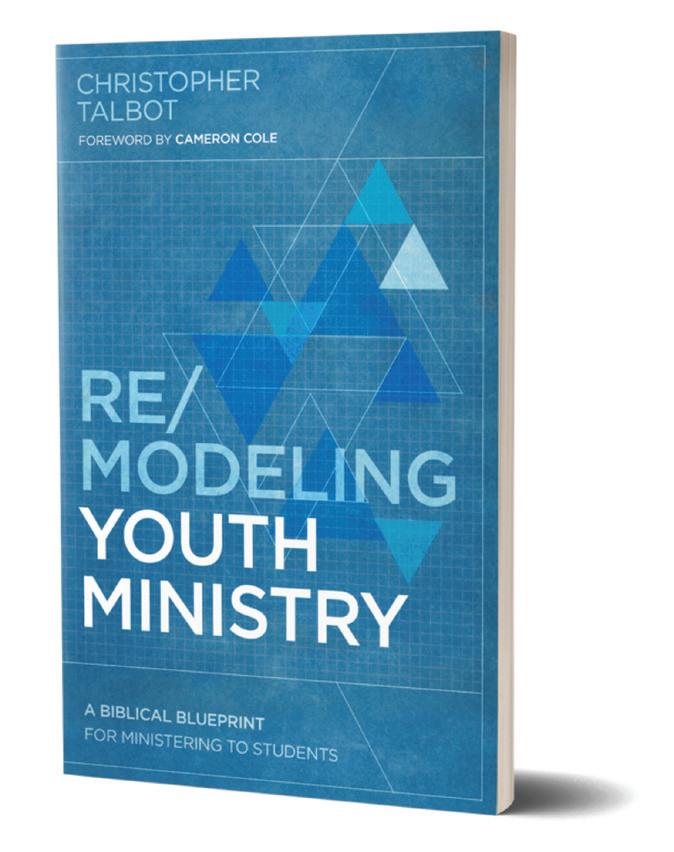
should always interpret passages within the broader scope of Scripture, which includes all kinds of references to wars and swords and so forth. I believe a pacifist interpretation of John 18 is incorrect. The uncompromising insistence of some Anabaptists that John 18 teaches an unqualified ethic of pacifism makes the passage say too much and seeks to bind men’s consciences in ways they ought not be bound.
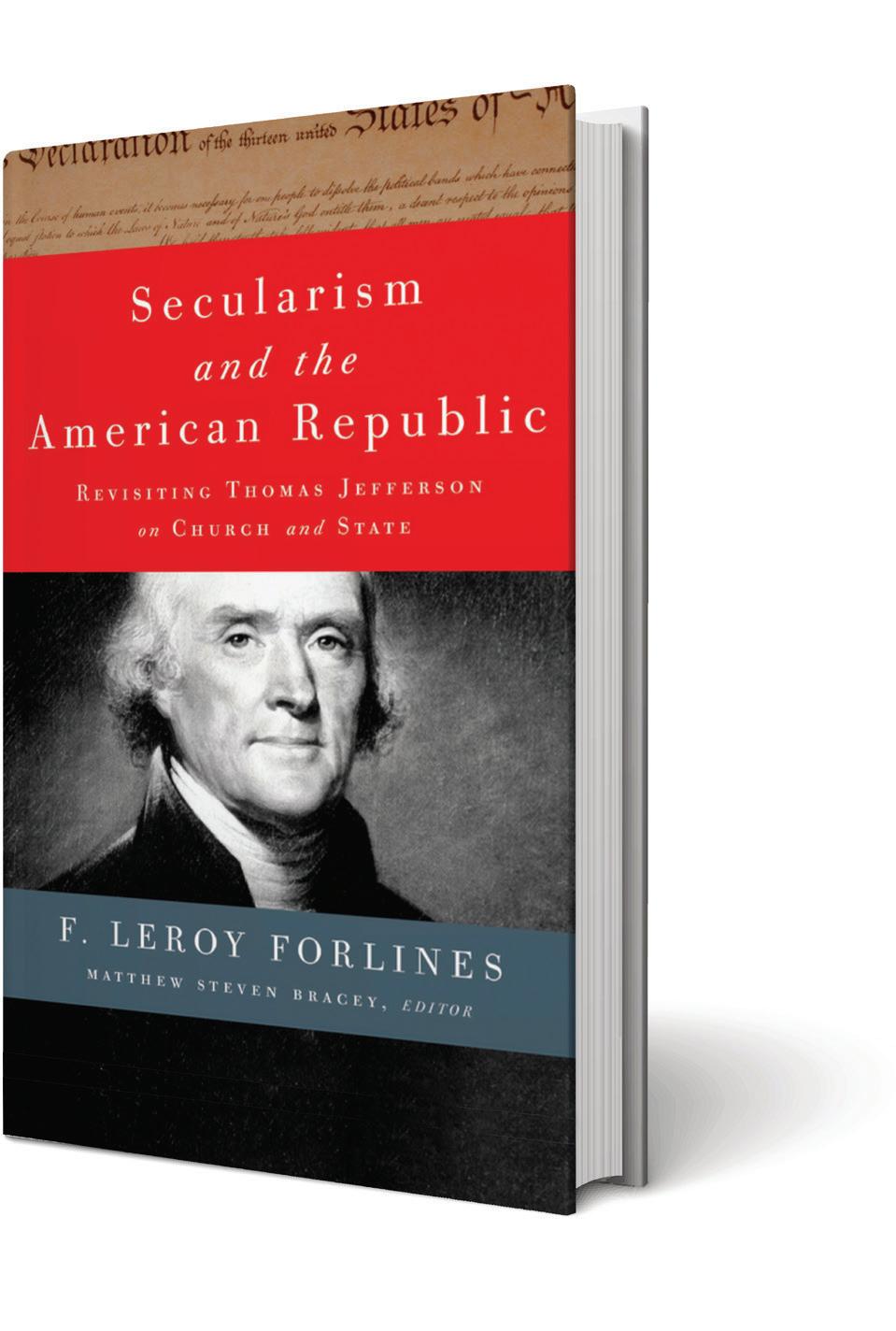


In some ways, I end where I began: humility. We must recognize our limitations. We are finite and sinful, whereas God is infinite and holy (Isaiah 6:1-5; 55:8; Psalm 14:3). Practicing this truth increases our ability to interpret the Scriptures with fidelity. In addition, as we discuss the Scriptures with others, we must do so in a manner that builds them up. We must treat them with dignity and honor, as we all, brothers and sisters in the Body of Christ, seek the truth of God together.
About the Author: Matthew Steven Bracey is vice provost for academic administration at Welch College, where he also teaches courses in Christian Ethics, history, law, theology, and interdisciplinary studies. He holds degrees from Cumberland School of Law (J.D.), Beeson Divinity School (M.T.S.), and Welch College (B.A., History, Biblical Studies).
Welch.edu/WelchPress Now available from Welch College Press
BROWN on GREEN
Volatility
BY DAVID BROWN, CPA
Generally, people say they don’t like volatility in the stock market, but what they mean is they don’t like significant downturns in the market. They are fine if the market goes up significantly, which is also a volatile market. The truth is the market can be volatile in both directions. Over the last 60 years, the S&P 500 has swung up or down by 15% or more 27 times, or 45% of the time. Fortunately, the 15% up-swings vastly outnumber the downturns 22 to five. The number of positive years for the S&P over 60 years also vastly outnumber the negative years 44 to 15, with only one year flat (neither a gain nor a loss).

When you consider the S&P returns over its history, the average has been around 10%, but it hardly ever returns exactly 10% in any given year. On average, the market has a negative return about 25% of the time. Usually, those negative returns are for a single year only, with a positive return the following year.
Over the last 60 years, the market had a negative return for two or more consecutive years twice. In 1973 and 1974, the market had two years of negative return, and from 2000 to 2002, all three years had negative returns.
When calculating returns for a retirement account or endowment, we like to use averages. If we assume the historic average of the S&P is 10%, then using this average will give us an idea of the value of an account or endowment in the future. However, we know this is not always how it works in the real world. Consider the last 10 years. This year saw a -19.44% return, 2018 was
-6.24%, and 2015 a negative .73%. Since 30% of the years were negative, you might be surprised to find the average return for that period was 11.5% because the positive years were very positive.
Over the years, a new way to calculate future earnings has been developed called the Monte Carlo Simulation. This calculation acts more like the true market with random years of negative and positive years. This simulation is closer to what really happens to your retirement accounts and endowments.
If you are a long-term investor, you will find no better place than the U.S. stock market, but having said that, expect volatility—both negative and positive.
Will the market go up or down in 2023?
The answer is YES.
About the Columnist: David Brown is director of Free Will Baptist Foundation. To learn more about the grants program, visit www.fwbgifts.com.
ONE Magazine April-May 2023 | 35
NAMED A
BY BRENDA EVANS
It was early February 1992. My husband Bill and I had just spent an hour with two second-opinion oncologists at Vanderbilt University Hospital in Nashville, Tennessee. A month earlier, a surgeon had removed three-fourths of Bill’s stomach because cancer had broken through the wall of his stomach and invaded nine of 28 lymph nodes. The pathologist was uncertain about whether the cancer had spread to other organs.
Bill’s oncologist, Dr. R, offered an experimental chemotherapy plan—if Bill elected to do chemotherapy. He had used the plan on two previous patients; both died within a year. So, he urged us to get a second or even a third opinion before we decided. We chose the two Vanderbilt oncologists. The younger of the two, Dr. G, said there was no guarantee with Bill’s oncologist’s plan. He talked about numbers, chances, and statistics. The other, Dr. J, put his thumb and forefinger together to form a zero: Bill’s chances of survival. “But I never count God out,” Dr. J said. “When you leave here today, make plans for the future, and I don’t mean plans to die.”
More like a theologian than a doctor, he added: “One more thing, Mr. Evans. There is something good about your situation that you do not realize right now. You are going to be acutely aware you are mortal and acutely aware of what mortality means. Most people never have that privilege.”
PRIVILEGE?!? That was the bitter best of Bill’s prognosis: the privilege of being acutely aware of what mortality means—mortality with its beastly underbelly of suffering, perishability, death, and its sting.
Until that February, I assumed a permanence to our lives. A certainty, a coherent longevity. Of course, I knew deep-down death was inevitable. It would happen to me, to Bill, to our sons and their wives, to our only grandchild, a beautiful curly-headed, two-month-old baby girl. But death was distant, remote, a provable theory that would bear out—someday, somewhere. But not here. Not now.
36 | ONE Magazine April-May 2023
We didn’t talk until we hit the I-440 loop around the south side of Nashville.
“Did you hear that thing I told Dr. Johnson?” Bill asked.
“Which thing do you mean?”
“That God is able to heal me but not obligated to.”
“Yes, I heard.”
“I mean that, Babe. He’s not obligated to do anything for me. He’s done enough already. He doesn’t owe me a single thing.”
“I know, but I wish He did…owe you, I mean,” I replied. I knew He was not our magical god-in-abottle, our genie, but in that moment, I wished He were. I wanted to command, even beg Him to let Bill live.
“And I won’t try to bribe Him or make deals with Him either.”
“I know you won’t.”
We rode on. Cars whizzed toward and around us, everybody going somewhere, most a different direction than us, I assumed. A large flock of winter birds plunged and pitched, swooped and swirled just above the cars ahead, then spiraled sharply right and disappeared among a row of trees.
“God knows if one of those birds falls,” Bill said. “But He doesn’t always put out His hand to catch it.”
Bill was always one to speak in analogies. Truths were clearer to him that way. Sometimes his analogies confused me, but not this one, even though he didn’t say it all. Bill was a soaring bird. Disease had damaged his wings. Soon, he would plummet to the ground and die. As for God, He was not obligated to put out His hand, not obligated to lift one finger to stop that fall. That’s what Bill meant and what he believed.
“He can; I just don’t know whether He will,” he said.
“I know, I know.” Maybe God would, maybe God wouldn’t, but I didn’t say that aloud. Nor did I say, that to me, an equivocation is the same as a “no.” That’s how it always was in my childhood with my father. His equivo -
cation never seemed to come out my way. It always ended with a no.
Looking back, I believe in that moment I was certain God would allow Bill to plummet from a living, breathing, thriving husband, father, and new grandfather to a dead one. From walking on the soil of this earth to lying beneath it.
But I could not say, “You are going to die.” So, I said nothing.
“He’ll pay attention, but He may not keep me from falling.” Bill was still thinking about the flock of birds. His usually strong voice was soft, too gentle. Although his eyes were dry, I felt he was weeping inside, maybe even silently begging, “Catch me, Father. Catch me.” But he said nothing more aloud.
“But you’re not a bird. You’re better than that. If that is His plan, I don’t like it,” I said.

“I never said I like it either.” His voice was steadier. “It’s just that He has always watched over us. He still is watching, and He will be in the future. Whatever He does or doesn’t do is all right. It will ultimately be good and good for us.”
“Even if it kills you?”
“Yes.”
We moved into an exit lane of I-440 and onto the curved ramp to I-24 East—a shift, a junction, a turn, an entrance ramp going a new direction. Instinctively, I grabbed the armrest, although I-24 East was a familiar road we traveled often. This day, the simple turn suddenly felt dangerous, a threat I could not yet define.
“Our boys will not understand if I don’t do chemotherapy, even if it doesn’t do any good or kills me,” Bill said as he maneuvered smoothly into the flow of traffic. I unclenched from the arm rest. “They will think I’m giving up without a fight, so I need to do it whether it helps or not.”
“I know, Babe; I agree, but you will be miserable, Dr. R says.”
“I can do it. I think I have to…for them,” he said.
That quickly, Bill decided to have chemotherapy. In the February whoosh of speeding vehicles, I strained to see ahead. There was a threat out there somewhere in the winter haze. I imagined the two of us, weaving along a yellow
ONE Magazine April-May 2023 | 37
line on a hazardous road, not I-24 East, but some new, unknown road. Perhaps the road that passed over the rim of the world, where you fall from this world into another.
When Ben, our youngest son, was a small boy, just learning the alphabet, we were traveling US 60 in south-central Missouri. He spotted a narrow winding road named ZZ.
“Look! ZZ! That road is called ZZ,” he shouted.
“Yes,” I said.
“Where does it go?” he asked as we drove on by.
“If you take that road, Ben, you will fall off the end of the world,” I said.
“Really?”
“Yes.”
“Wow!” Ben said, his voice exposing small-child wonder. His two older brothers snickered at the ruse I had played on their little brother, but I was pleased with his curiosity and awe.
In early 1992, I learned there actually might be a road like the one that awed Ben. A road named ZZ that led to the falling off place, the end of our personal world. A road Bill and I had just decided we would take. A road where I couldn’t see the end or a way around or through. A road named ZZ.
Two years later, in mid-1994, Dr. R released Bill with these words: “Mr. Evans, if your cancer was going to get you, it already would have.” That two-year road was treacherous but doable by the Lord’s grace and healing. Bill still recalls those swooping birds on I-440 in Nashville 31 years ago and his words: “God is not obligated to do anything for me. He doesn’t owe me a single thing. He’s done enough already.” And He has.
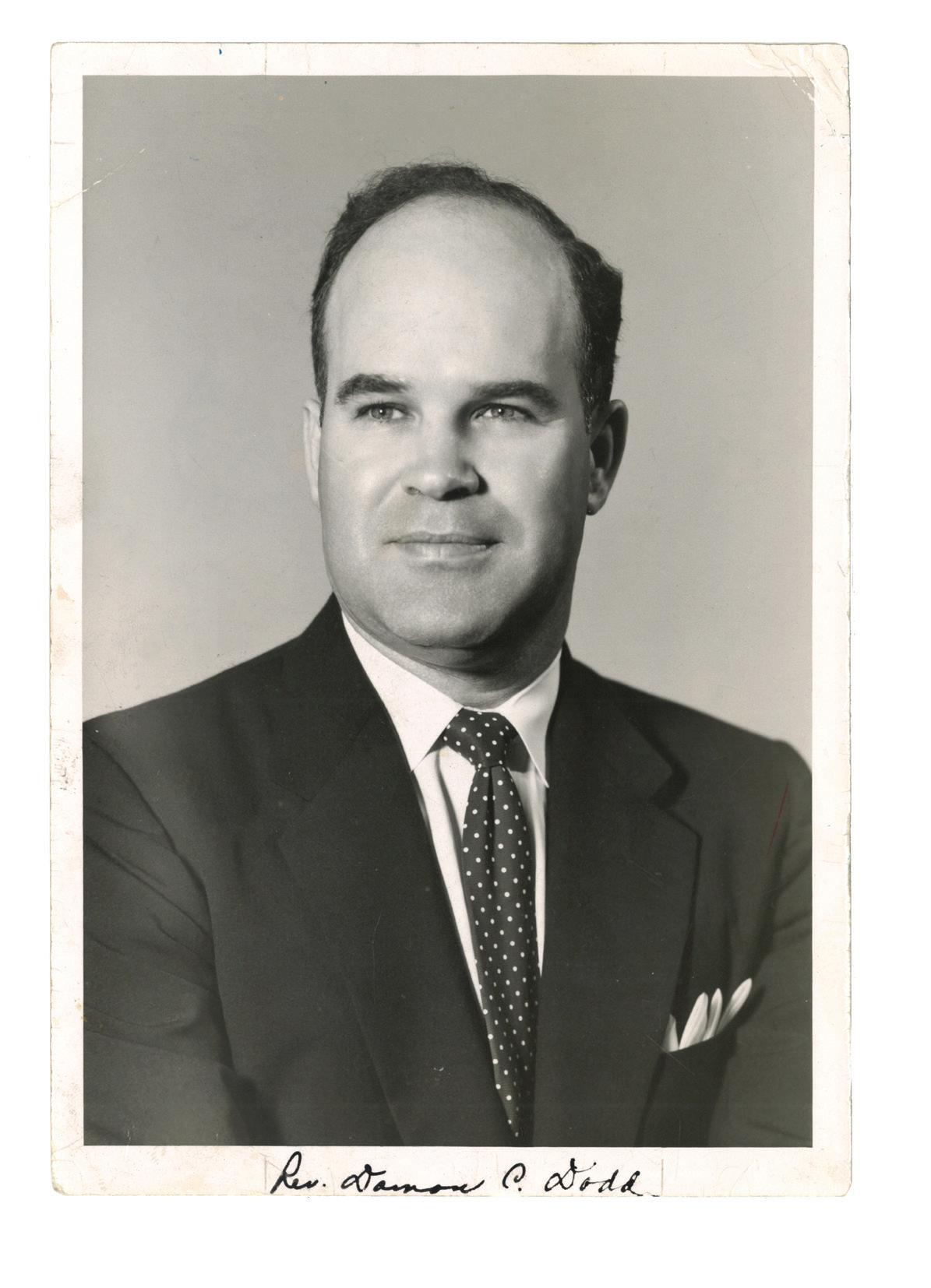
A Legacy of Cooperation
Saved July 1932 in Flat River, Missouri, Damon C. Dodd was ordained to the ministry four years later. Dodd began studies at Flat River Junior College, but when Welch College opened in 1942, he and his wife Sylvia joined seven other students in the inaugural class. Two years later, the couple made up half of the first graduating class. From that moment forward, Dodd involved himself in every facet of denominational ministry as a missionary (Cuba), pastor, church planter, evangelist, writer, and executive at every level. His broad experience served him well as the fourth executive secretary of the National Assocation (1949-53). Under Dodd's leadership, the national departments unified into a single office to serve the denomination more effectively. Help continue Dodd's legacy of unity through a gift to The Together Way Trust, an endowment with Free Will Baptist Foundation.
Free Will Baptist Foundation | www.fwbgifts.com
About the Author: Brenda and Bill Evans live in Ashland, KY. Contact her at beejayevans@windstream.net.
LEADERSHIP WHITEBOARD
Two Powerful Words Leaders Rarely Use
BY RON HUNTER JR., PH.D.
The higher you go in leadership, the more likely you are to drop the ball, make the wrong call, or come across snarkier than intended. When repeated often, these actions can create or compound problems. Yet, the numerous tasks leaders handle, the number of people with whom they interact, and the high pressure of responsibility make it inevitable that every leader will blow it at some point. Leaders often make more missteps than they realize, because employees cannot (or will not) point out mistakes. However, people notice these mistakes. So, how should leaders react when they let others down?
Leaders expect followers to adapt. However, adaptive leadership is also important. Adaptation suggests changing course, admitting error, and following the correct path. If adapting requires a course correction, the biblical approach is redemption. First, humbly acknowledge the offense (wrong direction, offense, sin), seek forgiveness, and, when sincerely repentant, avoid repeating the offense. As obvious as this sounds, part of seeking forgiveness includes acknowledging and admitting wrong, not only to yourself but also to your team or the other individual.
go from guarded to connected. They work harder and more passionately because they know they work with you and not just for you. An apology does not remove power from a leader; it adds it.
BIBLE VERSES
Isaiah 57:15
Psalm 34:18
Why is admitting wrong so difficult? Some leaders view admissions of error or apologies as weakness. When leaders continue to hold their perceived high ground, that self-deception destroys every bridge between them and their followers, making their position more like swamp land.
James 5:16
1 Corinthians 13:4-7
1 Peter 3:8-12
Luke 14:11
Proverbs 16:18
Proverbs 13:4
What results from leaders who admit and correct their mistakes? They gain trust because their words and actions display integrity. Truth provides the foundation upon which trust is built. Watch the faces of those wronged when they hear an apology. Their expressions
Saying “I’m sorry” to a colleague, follower, or even a child at home brings healing. A leader’s power can squelch other people’s opinions and rob them of worth, or it can give them value and worth. It’s better to build redemptive bridges than to blow them up. A sincere apology restores their value and empowers both them and you as the leader. Regardless of everything you have ever been told or believe about leadership, never fear saying the two most empowering words: “I’m sorry.”
About the Columnist: Ron Hunter Jr. has a Ph.D. in leadership and is CEO of Randall House & D6 Family Ministry. You may contact him at ron.hunter@randallhouse.com.
ONE Magazine April-May 2023 | 39
How to Raise an
BY JOHN BRUMMITT
When we hear “Ebenezer,” the first thing that pops into our heads might be Ebenezer Scrooge, especially around Christmas. The main character in the 1843 novel A Christmas Carol by Charles Dickens, Ebenezer Scrooge is one of the wealthiest men in town, but also one of the cheapest. According to an article in Forbes, today, the old miser’s net worth would be in the ballpark of $10.3 billion, and when the novel begins, Ebenezer is determined not to share a farthing!
Or, perhaps, hearing “Ebenezer” leads your mind to the lyrics from the old hymn “Come Thou Fount of Every Blessing.” The second verse offers those familiar words: “Here I raise my Ebenezer; Hither by Thy help I’m come…” In this instance, Ebenezer recalls the importance of remembering the Lord’s help.
The name Ebenezer comes from two Hebrew words: eben, or “stone,” and ezer, meaning “help.” So, the Hebrew name is literally “stone of help” and pictures the Lord’s power to give the Hebrew nation victories. In Old Testament times, victories in battle and other significant events were memorialized with markers, often made of stone. We continue this practice today by placing flags at battle sites or erecting monuments in places of remembrance.

In one instance, the judge and prophet Samuel set up a com memorative marker, a stone, and called it Ebenezer, saying, “Hitherto hath the LORD helped us” (1 Samuel 7:12b). The name builds on the frequent Old Testament imagery depicting God as a rock, suggesting His strength, steadfastness, defense, and resolution. In Samuel’s case, the marker gave worship and honor to the Lord who gave them victory over their enemies. And the “battle” in 1 Samuel 7 really wasn’t much of a fight, because the LORD thundered with a mighty sound, the Philistines ran, and Israel gave chase.
We find many such markers, with many different names, throughout the Old Testament. However, all were meant for the same action: giving praise and tribute to the Lord and remembering God’s presence and faithfulness to the children of Israel.
But what does Ebenezer have to do with finances?
Today, the battles won in our daily lives still need to be commemorated. The Lord brings us through our struggles by His grace and might. Many of these battles take place in the financial arena. One of the things my wife and I

40 | ONE Magazine April-May 2023
have tried to stress to friends and family is to celebrate financial victories and place a “marker” to remember God’s provision. Perhaps we seek the Lord’s help in paying off debt, covering a large and unexpected expense, or any number of other financial challenges. When God provides, we say, “Praise the Lord,” but then move on with our lives, quickly forgetting what He has done. We need to “raise Ebenezers” and keep these waypoints before us constantly to help us stay on track in the future. Ebenezers offer praise and tribute to the Lord and provide memory markers for us. Having Ebenezers in our lives helps us in two ways.
First, an Ebenezer allows us to remember the Lord’s provision. When we are delivered from a trying time or situation, it is human nature to focus on and remember the negative more than the positive. If we struggled to pay bills when we were younger, we are more likely to feel that struggle long after our financial situation has progressed to the place of not needing to worry. Positive reminders before us helps refocus from the negative
struggle to the positive reminder of God’s sufficiency.
Second, remembering God’s provision reduces stress in our lives. Sometimes, it is hard to have faith in someone we just met or trust what they say, but as we spend more time with them, we develop faith in their words and actions. In our walk with God, remembrance markers help us count our blessings—a quick reference guide to the faithfulness of God.
Ebenezers can be decorations at home, sticky notes on the computer and mirrors—anything to create a permanent reminder. Building memories with positive capstones will help us trust God in difficult times rather than being paralyzed by fear and negativity.

So, raise your Ebenezer, and return to it often!
About the Author: John Brummitt became director of the Board of Retirement in January 2016. He graduated in 2011 with an MBA from Tennessee Tech University. A 2004 graduate of Welch College, he has been with the Board of Retirement since spring 2006: www.BoardofRetirement.com.
Being successful in most things, large or small, requires certain financial means. Does your current financial plan reflect your future ministry goals? If you have yet to establish a plan for retirement, we can help. That way, when the time comes, you can reach your goals.

Let us help you prepare for your future ministry!
What do you see in your financial reflection?
BoardofRetirement.com
There Is Always a Story
REMEMBERING
THOMAS LUTHER MARBERRY (1949–2021)
BY TIMOTHY W. EATON
Everyone who knew Thomas Marberry had a story to tell about him. College students, seminarians, co-workers, ministers, and missionaries—all were somehow impacted by his life. So, how does a friend and colleague tell others about a hero like him? There is always a story.
In 1998, Thomas and I represented Randall University on a missions team to Cuba. The goals of the trip were to bring encouragement to Free Will Baptist churches on the island and to engage in Bible training at Cedars of Lebanon Seminary. On the last Sunday there, the team met with local Christians in Havana for a joint evening service. As the speaker for the evening, Thomas preached in Spanish and also interpreted for the English speakers. Afterwards, the Cubans provided supper for the Americans. Marberry, however, was strangely absent. We eventually found him sitting in the courtyard of the home, sharing the gospel with a ten-year-old Cuban girl. The scene painted a vivid contrast: the soft-spoken little girl and big Thomas speaking in a tender tone. This took a conscious effort on his part, since his voice could only be described as thunderous.
The Spanish speakers listened intently, and the English speakers stood in awe as Marberry opened his Bible and guided
the girl through a salvation prayer. When she bounced away into the loving circle of Cuban moms, the little girl had no idea Thomas Marberry was a leading theologian, Bible scholar, and educator among Free Will Baptists. He was simply the big, kind man who led her to Jesus. That encounter tells you much of what you need to know about Thomas Marberry.
Early Years
Fred and Ruby Marberry welcomed their first son, Thomas Luther, to Houston, Texas, May 3, 1949. Thomas lived his teen years in Bryan, Texas, where his father worked as the club pro at a municipal golf course. Thomas recalled hot Texas summers working for Fred on the course. His favorite job was filling the water-cooled soda machine at the clubhouse. Thomas got to pick his favorite soda from the icy water as a reward for his work. Fred and Ruby were faithful to raise their family in the church, and in 1966, Thomas accepted the Lord at Fellowship FWB Church in Bryan.
After graduating from high school, Marberry began studies at a Texas regional university before transferring to Oklahoma Bible College (now Randall University), where he answered the call to preach.

42 | ONE Magazine April-May 2023
He later transferred to Baylor University in Waco, Texas, and earned a B.A. in 1971. He continued his studies, completing an M.Div. from Southwestern Baptist Theological Seminary in 1973 and a Ph.D. with an emphasis in New Testament studies in 1982.
Although a theologian, Thomas loved music of all types. Until God led him to ministry, he planned to become a band director. At Baylor, he played tuba in the Baylor marching band, symphony, concert band, and wind ensemble. He was active in the Hillsdale brass ensemble, and his powerful tuba playing anchored the fight song, “When the Saints Go Marching In,” at Saints basketball home games. Oklahoma Bible College classmates recall a young Thomas playing the tuba while practicing marching band maneuvers on the open fields across the Moore campus. Thomas often quipped that while he was a student at Baylor, the football team only won three games, but the band never lost a half-time!
Teacher
Thomas served in various capacities during his ministry and teaching career, but his first love was always teaching. At Randall University, he served as a professor of New Testament from 1975–1983 and vice president for academic affairs from April 1983 to June 1989. In 1989, he returned to the classroom, where he continued to teach until June 1999, when he accepted the presidency of the Seminary of the Cross in Mexico. He returned to Randall in 2008 to serve once again as the vice president of academic affairs until 2013. Then, once again, Thomas returned to the classroom, where he continued until his death. On May 11, 2013, the Board of Trustees awarded Marberry the faculty rank of Distinguished Professor of New Testament, the first professor to receive this honor. One of Marberry’s greatest gifts to colleagues and students was his sharp wit. In response to a common question from brave upper-level undergraduates, “Dr. Marberry, why do you talk to yourself?” Thomas retorted, “It’s the only way I can have an intelligent conversation.” When a student struggled with Greek translation, Marberry would quip, “Well, you gave it the good ole college try; now, let’s see if we can smooth it out a little.” When a student got something right, he often said, “You hit the nail on the head, buddy!”
Following his death, these and other colloquialisms from the beloved professor poured in from former students.
Oklahoma pastor Jeff Blair recalled these familiar Marberryisms:
• “Before you preach a passage, be sure to read it out of at least five translations.”
• “The Holy Spirit gets blamed for a lot of sermons He had nothing to do with.”
• “Why do college graduates need to go to seminary? Tell me, what church that has anything to offer is going to call a 21-year-old fresh out of college to be their pastor?”
• “When a young man comes to me and says the Lord has called him to ministry, I tell him, ‘I’m glad to hear that. Come see me in a year, and if you still think the Lord has called you, then we’ll do something about it.’” At Marberry’s memorial service, Jim Harris, a former Randall ministerial student, described Marberry as brilliantly simple. “He had a knack for communicating the most complex theology in a manner I could understand. Sometimes the smartest answer he gave was to admit ‘we don’t know’ rather than speculating a response that would be on shaky ground at best. What mattered most to Dr. Marberry was that we made sure we stood on strong biblical grounds—whatever our conclusions.”
Harris went on to observe Marberry had a similar approach to ministry. He took it seriously but also kept it simple. He led, preached, responded to ministry needs, and encouraged others to follow his example of leading with an appropriate use of God’s Word.
Missionary
Though deeply committed to Randall University, in July 1999, Thomas accepted the position of president of the Seminary of the Cross in Reynosa, Mexico, just across the border from McAllen, Texas. He served there through July 2008. North American Ministries introduced Thomas and Wilma Marberry as new missionaries in 1999, and Dr. Marberry explained his decision to relocate: “We made our first mission trip to Mexico in 1989 with a group of students and faculty from Hillsdale. …On every subsequent visit, we have developed a deeper appreciation for the seminary, for our churches in Mexico, and for the Mexican people. …We believe that God is leading us to go to the seminary…to develop the best training institution possible for Spanish-speaking Free Will Baptists.1
ONE Magazine April-May 2023 | 43
Marberry’s unique connection with the Hispanic community was evident to anyone who knew him. Spanish-speaking ministers gathered with the Marberrys at National Conventions, invited him to teach or preach at their churches, and honored him at every opportunity. Though Marberry eventually transitioned back to Randall University, the seminary and Hispanic people and pastors remained on his heart.
Missionary Heart, Scholarly Mind
Thomas exhibited a heart for missions throughout his lifetime of ministry. He served as a sponsor for Student Mission Fellowship at Randall University and was instrumental in organizing and sponsoring trips to Mexico throughout the ’90s.
His educational and intellectual dedication intensified during his tenure as the president of the seminary in Mexico. During this time, Thomas reached the height of his intellectual and linguistic powers. A diligent student of Koine Greek since his days at Oklahoma Bible College, Marberry honed his skill through seminary and over decades of teaching ministerial students. His study and understanding of Spanish, however, did not occur until age 40 and was driven by love for Hispanic people. While known widely as an educator, Thomas served Free Will Baptists in many capacities. He pastored churches in Oklahoma and Texas, concluding his pastoral work at First FWB Church in Oklahoma City. When the First Church called Marberry, it was offering Spanish and English ministries led by different pastors for each language group. Marberry’s language skills enabled him to strengthen common activities, enhance the unity of the church, extend service into the community, and provide effective ministry.
Thomas was a conscientious educational and ministry colleague. Often serving as clerk for campus committees, he had a knack for ending debates with: “This is not the law of the Medes and Persians.” Around university lunch tables, Bible and theology were common debate subjects among the faculty. When colleagues pressed Thomas for speculative interpretation, he simply replied: “It is not in the text.”
Marberry also held various positions in the denomination and served as convention reporter under Jack Williams for years, helping to publish the daily news for the annual convention. He authored articles for Contact and ONE
Magazine, including a monthly theological column titled “Top Shelf.”
Yet, Marberry’s scholarship may have been his greatest gift to the denomination. He served on the Commission for Theological Integrity from 2018 to 2021, was a contributing author for The Inspiration and Preservation of God’s Word, and wrote the commentaries on Galatians, the Johannine Epistles, and Luke in the Randall House Bible Commentary series. In his theological work, Marberry offered a rare intellectual acumen and breadth of scholarship. For him, good exegesis was essential to good discipleship.
Life Well Lived
When Dr. Marberry announced his retirement from Randall’s full-time faculty in late 2020, he intended to move near Wilma’s family in Idaho. He quipped, “Wilma has followed me around all these years, and I am happy for her to have this opportunity to spend more time with her family.” 2
Sadly, the Marberrys never had the opportunity. Thomas was hospitalized in late January with severe heart complications, and on February 5, 2021, he went to his eternal reward. But not before training at least three generations of ministers and missionaries. Those students have scattered across the world, as commanded by the Lord Jesus. Wes Holland, longtime missionary to China, reflected on the impact Dr. Marberry had on his life and countless others: “I believe Thomas and Wilma have many sons preaching the gospel, teaching the Scriptures, doing ministry, and serving as missionaries around the globe.”
There’s always a story and make no mistake: the story of Thomas Marberry was a great adventure in scholarship and faithfulness.
Adapted from Arminian Baptists, which traces the history of Arminian Baptists through the biographies of key historical figures. Order your copy from www.store.randallhouse.com.
About the Author: Dr. Timothy Eaton, a Native American, serves as academic chancellor of Randall University. He previously served as president of the university from 2004-2019, after serving in various capacities at the university since 1989. Learn more: www.ru.edu.
1 Thomas Marberry, “Thomas Marberry Assumes New Post,” Advancing in Missions, July/August 1999.
2 Thomas Marberry, personal communication to Timothy Eaton, 2020.
44 | ONE Magazine April-May 2023
FUN WITH FORREST
TUESDAY 9:00 PM
Tickets are $10 during pre-registration and $15 onsite.
JULY 16 - 19, 2023 • RALEIGH, NC
SPEAKERS
SUNDAY AM SUNDAY SCHOOL: Truth & Peace Students
SUNDAY AM: Mason Polk (Moore, OK)
SUNDAY PM: Andy Rains (Lebanon, MO)

MONDAY PM: Arlene Pellicane (Chula Vista, CA)
TUESDAY PM: Aaron Pierce (Wilson, NC)
2023 Buck-a-Week Offering

Tuesday Evening Service
NAM Recipients: Team Athens (Joel Franks and B. J. Eaton) Athens, AL
IM Recipient: Taylor Pate Japan
verticalthree.com

Sowing Seeds of Faithfulness
BY BETHANY DOUGLAS
On July 31, 2022, family, friends, and church members past and present gathered to honor Dr. Larry Condit and his wife Joan for 50 years of faithful service at Capitol Free Will Baptist Church in Sacramento, California. The service featured songs, testimonies, and remarks by several family members and close friends, including Joan Condit, their daughter Caren, and close friends Doug and Lori Veercamp. Dr. David Crowe preached the message. In her testimony, the Condits’ daughter Caren described her parents’ ministry as the biblical picture of faithfully sowing gospel seeds in preparation of a great harvest.
Preparing the Soil
God began preparing the Condits for this ministry long before they ever began Capitol Church. It all began when Larry was 18 and first met Joan while visiting a church in Salinas, California. As they began dating, Larry also began his biblical education at California Christian College. Joan graduated at 17 and joined him there. After a year of Bible college, they married and quickly answered the missions call to Japan.
Just as the planter carefully cultivates the soil in expectation of growth, God used these years to cultivate the foundation of the Condits’ life of Kingdom service. He used their time in Bible college to ground them in the Word
and begin relationships that have been a blessing and encouragement to them throughout their ministry. He used their time in Japan to help the Condits develop a passion for evangelism and practice daily submission, faithfulness, and obedience to God’s calling for their lives.
Sowing the Seed
After a year in Japan, Larry saw a newsletter sharing the need for a church plant in Sacramento and immediately knew God was speaking to him about the opportunity. Though the Condits were still very young, they were prepared to follow God’s calling once again, and two months later, they became new church planters.

On the first Sunday in Sacramento, only two women and five children attended the service, but just like the miracle of two fish and five loaves, God gave the increase. Thanks to the use of an old, donated school bus, the church grew to a hundred people in just a month. That first year, Larry and Joan also welcomed two new church members to the family: twin daughters!
Despite the challenges of pastoring, parenting, and continuing their education, the Condits followed God and faithfully sowed gospel seeds in the community daily. And the church continued to grow. Before long, the congregation outgrew their original space and added an education

46 | ONE Magazine April-May 2023
building that hosted years of Bible studies, weddings, choir practices, and pie auctions. As they sowed seeds, God made them grow, and the church eventually outgrew their first location and moved to the current church home.

During the anniversary service, countless remarks were made about Larry’s gift of evangelism. Longtime friend, Doug Veercamp, observed Larry is always looking for opportunities to share about Jesus. Pastor Larry describes these opportunities as his “fishing hole,” because he is always “fishing” for new souls to save. Larry found his most recognizable fishing hole in the early ’90s when he purchased his first mule Rocky, and his ministry changed forever. Since then, God has used Larry and Rocky to spread the gospel through trail rides, parades, and cowboy church services. By simply allowing God to use even his hobbies to testify of Jesus, he has been privileged to lead many cowboys and cowgirls to Christ and to share the gospel with countless others across the state of California and in the surrounding Western region.
Reaping the Harvest
When the Condits began their ministry over 50 years ago, they had no idea what the fruit of their labors would be. While there truly is no way to know the fullness of their gospel legacy this side of Heaven, God has graciously allowed them to see many of the seeds they faithfully sowed grow and produce a great harvest. Today, He continues to use the Condits to sow gospel seeds through their work at Capitol Church and in daily opportunities to share Christ in their community.
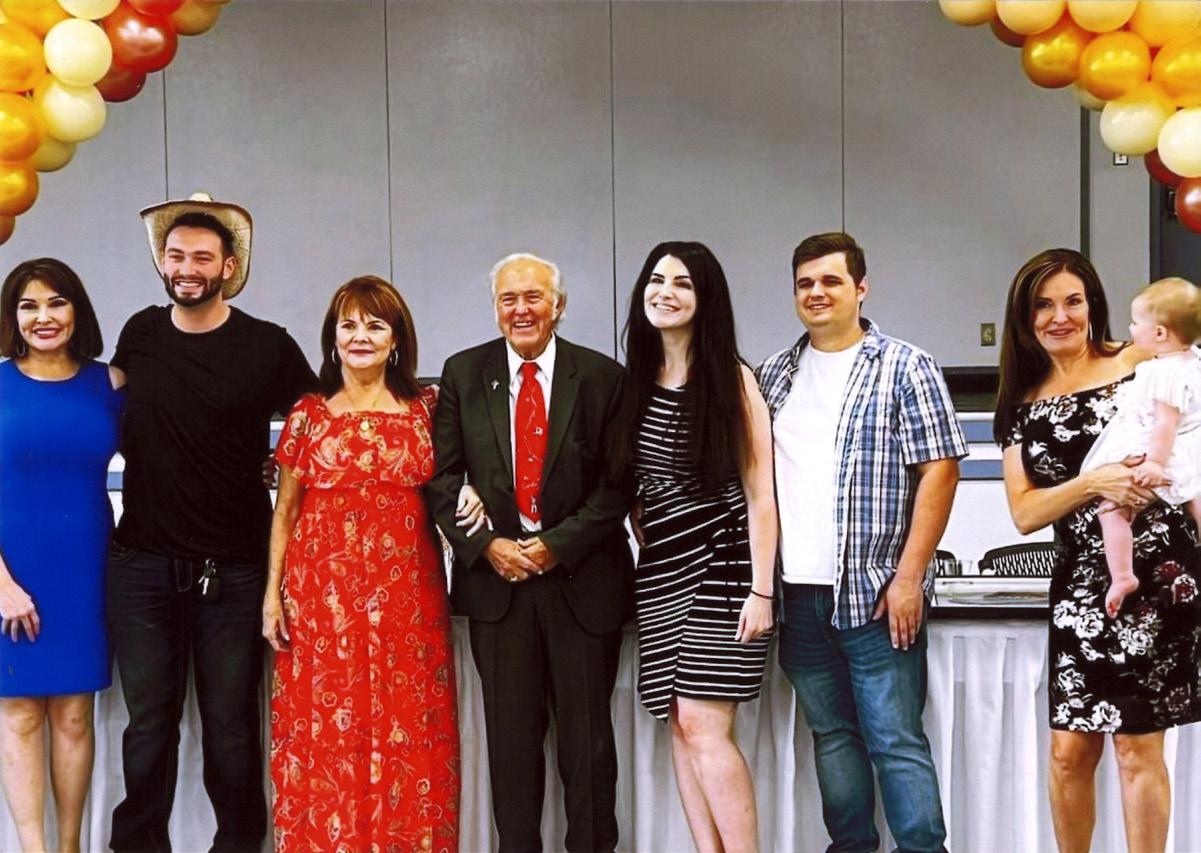
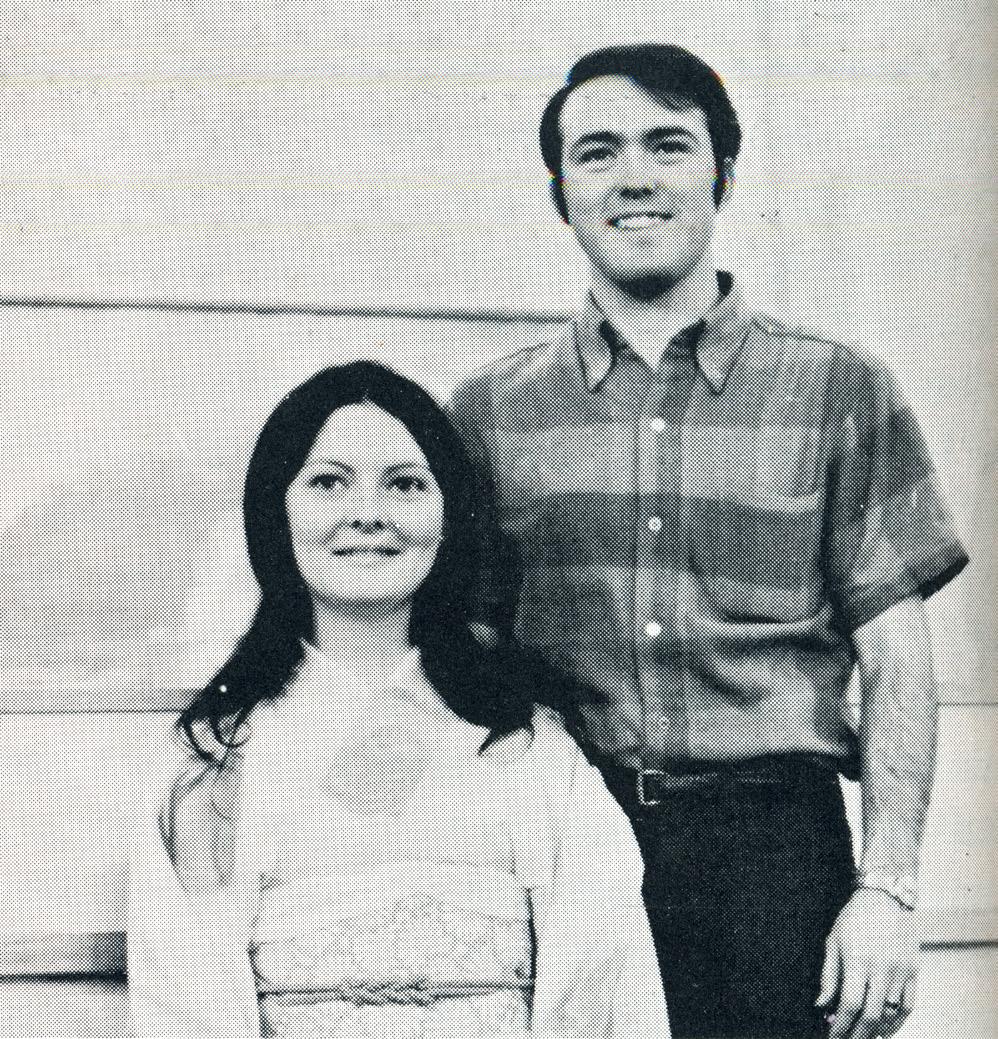
As we commend the Condits for 50 years of ministry and look forward to many more, may we also follow their example of faithful obedience to the Lord’s leading. Let us look for ways to sow seeds of the gospel each day and trust God will use our efforts to produce a great harvest for the Kingdom.
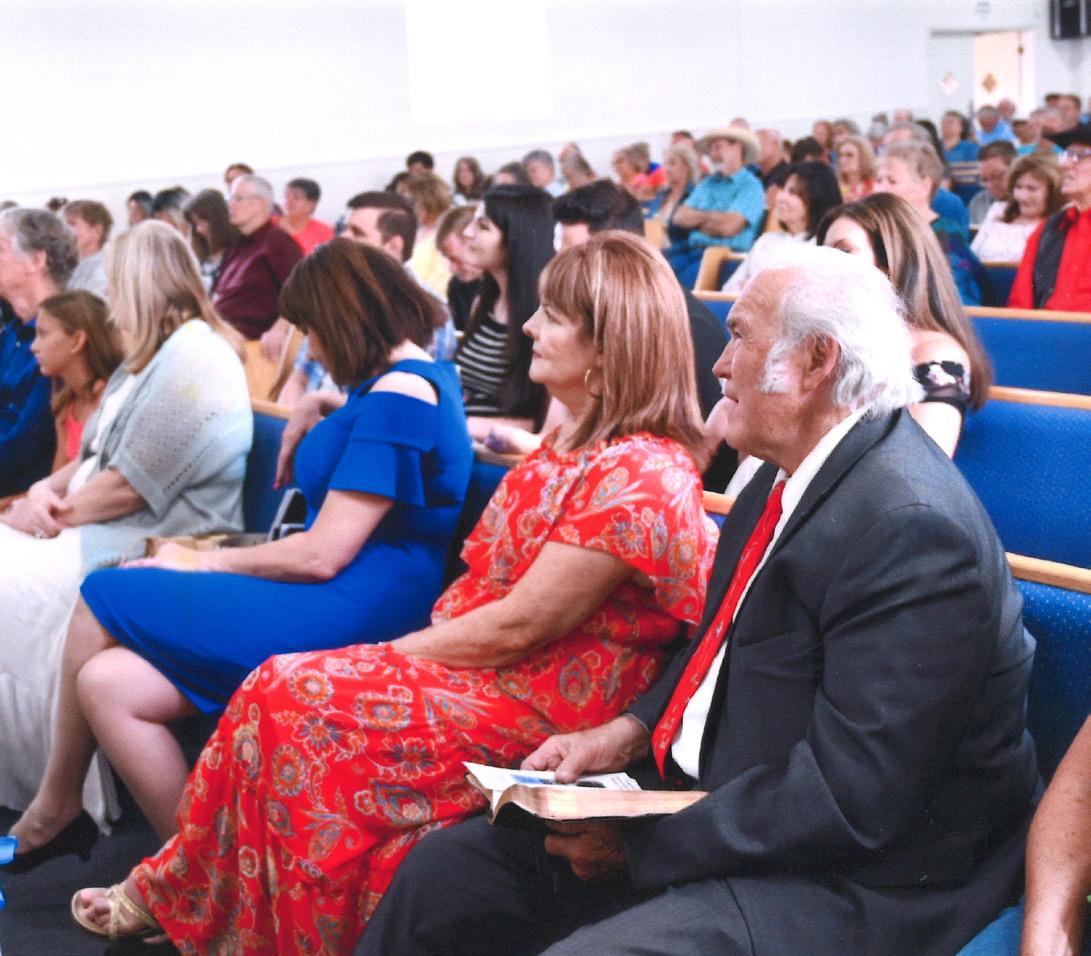
ONE Magazine April-May 2023 | 47
About the Author: Bethany Douglas is an administrative assistant at North American Ministries. Previously, she and her husband Thaddaeus served at the Free Will Baptist School in St. Croix, USVI. A Welch College graduate, she recently received an M.A. in English Literature from Murray State University.
Multi-Ethnic Ministry in the Local Church
BY MARSHALL BONÉY
One of the most wonderful aspects of spring is the anticipation of everything coming back to life—the reappearance of many varieties of foliage and vibrantly colored flowers. The colors of spring also serve as a reminder of how much I anticipate Heaven, where all the diverse hues and ethnicities of humanity will unite to worship God. Our Heavenly Father adores the magnificence of variety. In Heaven, we see a mosaic of people from every country, tribe, people group, and language congregating to worship around God’s throne (Revelation 7:9-12).
It’s a good reminder that our world is not black and white, but an amazing kaleidoscope of colors. We have an urgent need for all races to find the unity Jesus preached to and even prayed over His disciples (John 17:20-21). Jesus established His Kingdom from a multicolored array of people transformed by the power of the gospel (Revelation 5:9-12). This is not to suggest every church is mandated to be multi-ethnic. This often depends on the geographic location and surrounding community. For example, a church in Idaho or Mexico should look like the people in the area surrounding the church.
Still, the church should communicate the diversity of the gospel. I love what we see happen in the church in Acts 11, when Peter made it clear the gospel was intended for all people, not only the Jews. The church in Antioch,
especially, personifies the movement of the gospel toward diversity (Acts 11:19-21).
With these things in mind, consider this sad reality: only 13.7% of churches in North America are multiethnic. That means 86.3% of churches are homogeneous. Even more troubling: churches are ten times more segregated than the neighborhoods around them and 20 times more segregated than nearby schools. Even fewer churches have multi-ethnic leaders.1 These statistics might cause some to wonder about the potential of today’s church. How are we going reach everyone for Christ? Going forward, we must consider the demographics of our communities.
Advanced strategic planning is more effective when the pastor understands the demographics of his city or town. Statistically, what is the percentage of the religious population (Catholics, Baptists, Non-denominational, Free Will Baptists, etc.)? What are the demographics in terms of race, income, education level, and more? This information enables the pastor to identify potential visitors and reach out to the community more effectively.
The cost of reaching out to all demographics can be challenging, even difficult. However, the Word of God instructs us to conform to the image of Christ, not to be
1 Derwin Gray, The High Definition Leader, 15-16.
REFRESH
48 | ONE Magazine April-May 2023
comfortable in His image. This implies individual preferences must yield to the larger mission of the Christian community. I’ve discovered the reflection of God’s beauty shines in everything, and humanity is no exception (Psalm 50:1-2). To recognize His beauty in whatever we do, love must serve as the filter through which all ministry flows (John 13:34-35). Preach, evangelize, and confront with the motivation of love.
When building a multi-ethnic church, outreach gets people excited. However, outreach cannot be random but should be proportional to correctly-identified needs of the community. For instance, effectiveness considers available resources. Does the area have an unusually high number of laundromats? Perhaps raising funds for “free laundry” is necessary to assist in meeting an important need. Outreach may look different in affluent communities. Perhaps a church could host a community Easter festival. Once again, ministry satisfies a need.
In his book Building a Healthy Multi-Ethnic Church, Mark Deymaz points to the Great Commission in Matthew 28:19-20 and challenges readers to consider evangelism as cross-cultural. Whether a church planter or the pastor
of a long-established church, approach the situation with the ultimate goal in mind; consider the demographics, needs, and challenges; and act appropriately.

Within a multi-ethnic society, ministry leaders must consider minority opinions, which may be difficult. Diversity must be intentional when assigning leadership roles, displaying images on websites, or even choosing worship styles. For example, if southern gospel music is preferred, consider whether it relates to all. People who visit the church should be able to say, “I was greeted with open arms here.”
The nations have come to our doorstep, and the diversity that surrounds us will only increase. As a result, the time to prepare for the mosaic of worship in Heaven has arrived. Let us do our part to celebrate and share God’s gospel for everyone.
About the Columnist: Marshall Bonéy is the founding pastor of ReIGNITE Church in Virginia Beach, Virginia. Bonéy retired from the U.S. Navy after 22 years of service. He earned a bachelor’s degree in Christian Ministry at Welch College and Regent University and later completed a Master of Divinity and Doctorate in Ministry Leadership and Coaching from Regent Seminary.
Pastor, ever wish you had some practical training? Mark your calendar for a FREE two-day training intensive. + Strategic Planning + Values, Mission & Vision + Adversity & Spiritual Warfare + Developing Leaders + Much More... Registration is limited to 15, and preregistration is required. Reserve your spot today: 615-760-6137 Equipped... Over 12 HOURS of FREE Classroom Training! May 8-9, 2023 Nashville, TN FWBNAM.COM
Just Keep
 BY CH (LT) SHAUN HEMBREE
BY CH (LT) SHAUN HEMBREE
We have all seen movies where the heroes are flying high and loving life; everything is going their way. Then adversity comes. Someone bests them at their game. Someone defeats them and gets away, or maybe their significant other leaves. Something happens, and the hero is humbled and realizes the need to improve.
Over the course of a few short scenes, the weeks, months, or even years of training, preparation, and hard work are glossed over (usually with a fast-paced, catchy song in the background) before the hero tries again, and this time prevails. We have seen it time and time again. The hero undergoes a radical transformation to get stronger, smarter, or better in some way right before our eyes in a matter of minutes. He or she goes on to win the race, defeat the enemy, or win back the lost love.
We love a happy ending where the good guy wins, but we get a little short-changed in the process without realizing it. Because the transformation takes place in a few short minutes, the audience fails to appreciate the hard work, discipline, and dedication it took. The writer of Hebrews implores us to run with patience the race set before us (Hebrews 12:1-2).
I thought I knew what that passage meant. Now that I have spent ten years, nearly a quarter of my life, pursing the professional, physical, and educational requirements to become an army chaplain, I have a greater appreciation for what this passage is saying. We live in a culture of fast lanes, fast Wi-Fi, and fast food. We don’t like to wait. For anything. However, the best things in life come via perseverance and patience.
According to Webster’s dictionary, perseverance is the “continued effort to do or achieve something despite difficulties, failure, or opposition.” I believe the key words here are continued effort. I have learned perseverance requires intention. Reaching your goals does not happen over the course of a two-minute, choreographed segment like it does in the movies. The race of life must be run with patient, continual effort. We follow the script that God—the Author and Finisher of our faith—has written. We must get more comfortable trusting Him, giving continued effort and practicing patience.
We cannot stop running the race, even if we don’t like our results or how long it takes to get them. This is even more reason to continue giving effort. We also make

50 | ONE Magazine April-May 2023
Elliott Deilus Graduates From Chaplain School
Congratulations to Chaplain (LT) Elliott Deilus for completing the U.S. Army Chaplain Corps Chaplain Basic Officer Leader Course. Pictured with Dr. H. David Crowe, the endorser for the National Association of Free Will Baptists, North American Ministries, Chaplain Deilus looks forward to continuing his calling as a U.S. Army chaplain that began in 2006 as an enlisted soldier and included deployment to Iraq. The road to the chaplaincy has not been an easy path for Elliott or his family, but it was God’s calling. The chaplaincy takes a team effort, as does any ministry. Elliott credits his wife Jacqueline for encouraging him to continue through the long and tedious process. We are proud of Elliott and his representing Free Will Baptists around the world.

Please continue to pray for all chaplains ministering in
our communities as volunteers or serving in a full-time position in the States or abroad.
—Terry W. Austin, NAM Chaplain Support Officer
errors when we get ahead of the Author of our script, when we try acting out the next scene ourselves. We do this because we want control of the script, and when humans take control, disaster usually ensues. The lives of Abraham, Moses, and others provide great examples of why it is a bad idea to get ahead of God. We all want to finish the race, but we must not get impatient. Long-term effort is difficult. We just want to get to the finish line and enjoy the prize. However, for the joy set before Him, Christ endured the cross for us, a hardship we can only imagine. Who are we to say that our race is too hard or taking too long?
Without the seasoning that only comes with time, you will not appreciate what God is doing in your life’s journey. A strong finish requires continual effort despite difficulty, despite past failures, and despite opposition. I implore you, don’t give up on your race. Just keep running! Run with patience. Be comfortable with God’s timing. Understand things might take longer than you think they should.
Real life doesn’t look like the movies. Don’t let our fast-paced way of living deceive you. Good things take time. Faster is not always better. After all, if God answered every prayer the moment we said amen, what would be the quality of our faith? Probably on par with the transformation of a hero in the movies, over in two minutes and totally phony.
About the Author: CH (LT) Shaun Hembree is a chaplain candidate with the Army National Guard. Learn more about Free Will Baptist chaplain ministry: www.fwbnam.com/chaplaincy
. . . . . . . . . . . . . . . . . . . . . . . . . . . . . . . . . . . . . . . . . . . . . . . . . . . . . . . . . . News Across the Nation
ONE Magazine April-May 2023 | 51
We cannot stop running the race, even if we don’t like our results or how long it takes to get them.
BY LESLIE NICHOLS
Things Little Do Well the
In the summer of 1806, five students met in a field, not wanting their fellow classmates to overhear them as they discussed how their lives would look if they “sold out” to the idea of world missions. When a storm quickly approached, the five took shelter under a haystack while the implications of their discussion set in. One of the five, Samuel Mills, spoke up and said, “We can do this if we will.”
A little closer to home, in 1969, the Foreign Missions Board entertained a motion to send out summer missionaries. Students with an overseas calling would have the opportunity to serve while still in college. The following year, six summer missionaries set out to various fields. Fifty-four years later, two still serve with IM.
In 1992, ETEAM provided the same opportunity to high school students. While it’s difficult to paint a perfect picture of how ETEAM has made a profound difference over the past 30 years, we can confidently say it has impacted over 2,000 students.

Fast forward to 2023. This summer, 90 students will serve in ten countries. Our College Missions Program (CMP) and Overseas Apprentices (OA) no longer send a handful of students; 40 students will minister in ten countries in 2023.
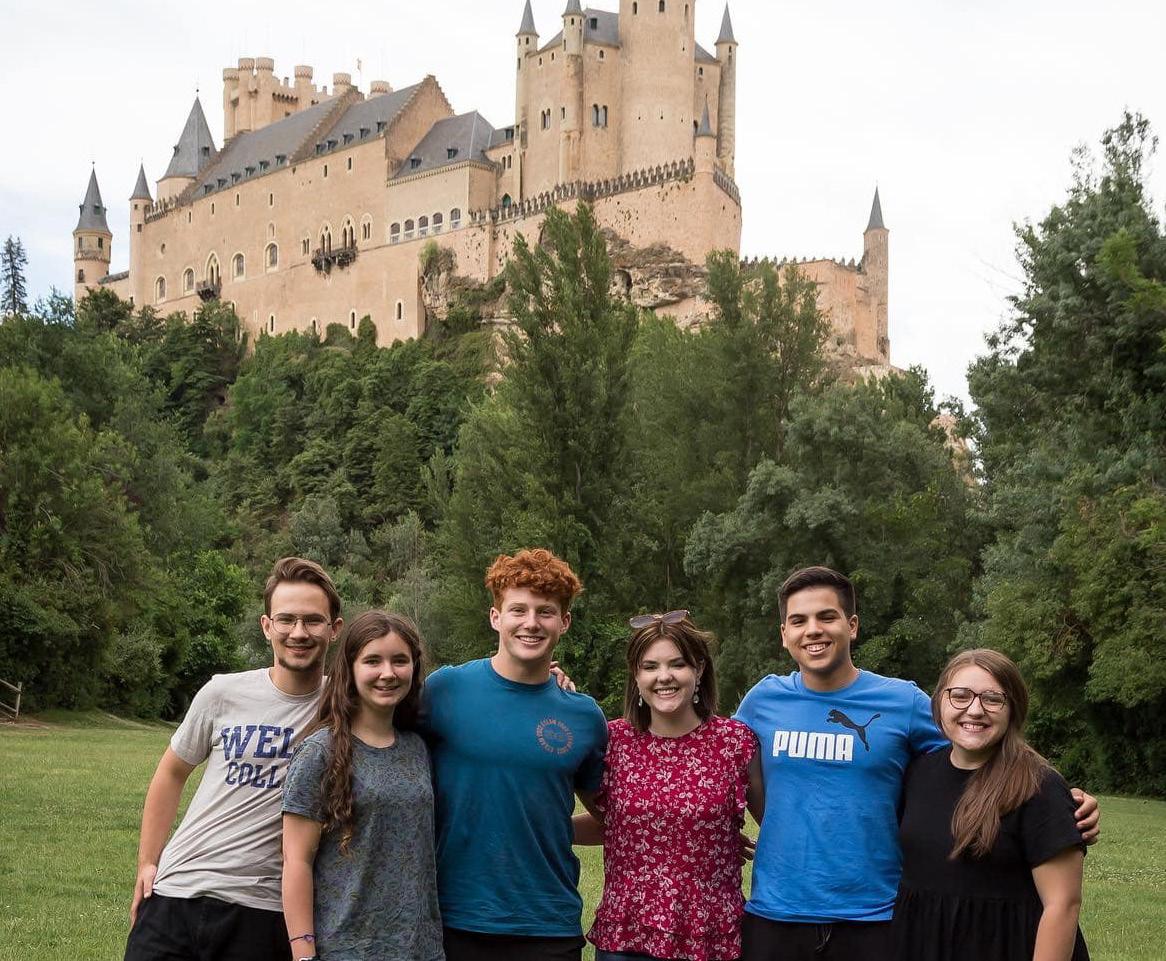
Looking Back
We must give credit to those who paved the way. The man known to people around the world as “Uncle Neil” served ETEAM each year since it began in 1992. It’s hard to know
on this side of eternity how many lives Neil Gilliland has touched over the years working in various capacities, but to say he will be missed in retirement is an understatement. Neil has an open invitation to continue to be part of ETEAM for however long he chooses.
Hanna Mott served ten years (2012-2022)—the longest-standing ETEAM coordinator in the program’s history. During those ten years, Hanna competently navigated the twists and turns and challenges to take the program to the next level. She truly cared about her ETEAM students.
Looking Forward
One of our board members often quotes an early church father: “Good, better, best. Never let it rest, until your good is better, and your better is best.”
As I transition into my new role as director of mobilization, that quote runs through my head often as I consider my vision. What does it look like for ETEAM and CMP/OA not only to continue but also grow to the next level? How can I build upon the successes of those before me?
52 | ONE Magazine April-May 2023
My short answer: do the small things well.
In 2021, Barna Research Group surveyed 24,000 teens (ages 13-17) from 26 countries and speaking 13 languages. Based on this research, they named the upcoming generation the Open Generation. Why? This generation is more open to discovering what the world has to offer them than any generation before them—for good or for bad.
No other generation has the information and technological capability these students literally hold in the palms of their hands. They are trailblazers. They aren’t afraid to be told no. They search for hours and hours to find the answer to their “why.” They seek to understand and be understood. They question the validity of ideas and people. They seek people who are real and strive to be real themselves.
This generation will accomplish things previous generations never thought possible. What could happen if, in high school, we helped them fall in love with the Great Commission and truly understand its command?
How would it look if we captured their attention? Helped them understand their gifts and the opportunities available to use those gifts overseas? How would their “Judea” change if their overseas experience came home with them?
I believe it will change the DNA of Free Will Baptists for generations to come if we capture the attention of the Open Generation. How do we do this? Do the little things well.
ETEAM
Lauren Herren began as ETEAM coordinator July 1, 2022, and hit the ground running. During her first four months, Lauren and her husband Cody established an ETEAM purpose statement: to engage students in God’s global church through cross-cultural experiences. They also crafted an ETEAM mission statement: “to train and equip mission-minded students to build relationships, actively abide in Christ, and make disciples, presently and in the future.”
The Herrens created a vision. By 2025, they intend to “create a cross-cultural, life-changing movement in students who will prayerfully seek out sharing the gospel.”
Lauren also established a tiered system for the ETEAM program:
• First-year students will be placed on teams in and around the U.S.
• Second-year students will be placed on teams in South America and Europe.
• Third-year students will be placed on teams in Japan and Asia.

College Programs
We are focused on keeping ETEAM students involved and aware of opportunities available to them with CMP/OA, no matter where they attend college.
While speaking with students over the past several months, I’ve realized we are in a unique era. Students want to serve overseas during college because they lost the opportunity to do so in high school due to COVID. We will have more extensive training for CMP/OA students in the spring to help prepare them for their summer opportunities.
We want to do the little things well and take care of our people well.
This means we help host missionaries by carefully vetting the students who apply and by sending students who help with their ministries. We will send students who have been trained and trained well . We also will send ETEAM leaders who will encourage missionaries while on the field.
We understand the magnitude of what sending each student and leader means in the big picture of the Great Commission. Our goal is not to make ETEAM/CMP/OA a cool trip but an opportunity for the Lord to open students’ eyes to what is possible through Him.

Continued on page 54

ONE Magazine April-May 2023 | 53
News Around the World
Uruguay—January 29, Pastor Ismael de Olivera baptized three new believers at the Cristo es el Camino FWB Church in Rivera, Uruguay.
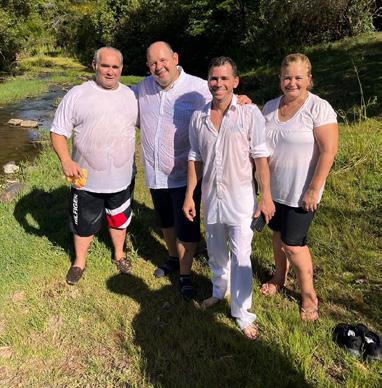
Bulgaria—“Praise God for a great turnout for our discussion on God Versus Science – An Artificially Created Conflict by Professor Todor Velchev,” Lydia Awtrey wrote. More than a hundred people filled city hall for this meeting.
Pakistan—A Christian security officer at an airport was threatened with a blasphemy charge after reprimanding a man for allowing an acquaintance’s vehicle through the security check without a pass. In security footage, the man is allegedly seen saying he will contact the Mullahs, accuse her of blasphemy, and they will cut her up in little pieces. Kenneth Eagleton urges, “Pray for this officer and other Christians who risk their lives daily in this Islamic country.”
Continued from page 53
• What if each ETEAM leader committed to their students for the following year and deepened their relationships beyond ETEAM?
• What if we committed to following up with students throughout the year at youth events or on social media?
• What if we helped our missionaries understand that when hosting a student or team, they may be hosting their next teammate?
I believe these things will happen when we focus on doing the little things well.
To finish the opening story: what started with five students meeting in a field under a haystack ended in one of the biggest student movements in history—the Student Volunteer Movement. Over the next 50 years, 20,000 students were sent overseas for missionary service.
France— Matt Price and two men from the Nantes church (Fadoumi and Aymeric), traveled to Togo January 6-14 to investigate the possibility of holding a pastor training conference there later this year.
Cuba—Ten people were baptized at the Good Samaritan FWB Church December 17, 2022.

Brazil—January 21, the First FWB Church in Campinas, Brazil, hosted a time of training and fellowship for everyone involved in aspects of leadership. Thirty-five people attended.
India— Partners in India held a two-day continuing education training course for pastors in January. The group is working to complete a building for a training center.

TWENTY THOUSAND STUDENTS!
What would it look like to take the call of the Student Volunteer Movement—the evangelization of the world in this generation—and apply it to the Open Generation?
One of the primary recruiting tools used during the Student Volunteer Movement was sending “soon-to-be” missionaries to college campuses across the nation. These new missionaries didn’t say “pray for me” or “give to me.” They said, “Come with me!”
I say the same thing to you today, come with me. In the words of Connecticut missionary Samuel Mills: “We can do this if we will.”
About the Author: Leslie Nichols joined IM in January 2019. In January 2021, she became College Missions Program (CMP) coordinator and became director of mobilization in January 2023. Learn how you can become involved in student missions: iminc. org/go/student-missions.
........................................................
54 | ONE Magazine April-May 2023
Driscolls Approved for Career Service Tom Willey, Jr. With the Lord
Antioch, TN— December 20, 2022, the IM Board announced the approval of Brenton and Debbie Driscoll as career missionaries to Bulgaria. The couple will work in the Varna church while Brenton pursues intensive language learning. The Driscolls have a strong passion for the people of Bulgaria, Debbie’s native country, where less than 1% of people have heard a concise presentation of the gospel.
Panama Free Will Baptists Celebrate 60 Years
Chame, Panama— Panamanian Free Will Baptists celebrated 60 years of organized ministry during their annual convention January 7-8, 2023 (a year late due to COVID). Attendees gathered on the seminary campus in Chame.
Business was conducted Saturday, culminating in the elections of a new president and executive committee. Saturday evening, the group celebrated 61 years of ministry with music and presentations from various churches. A video recalled the history of the work. Former missionaries (Steve and Judy Lytle and Stan and Brenda Bunch), representatives from IM (Clint and Lynette Morgan, Kenneth Eagleton, and Jaimie and Tammy Lancaster) and national workers past and present were honored.
The recognition of current and former alumni and professors highlighted the important work of the seminary. Kenneth Eagleton reflects, “The seminary has had a huge impact on our work in Panama. Several of the current pastors, seminary teachers, and other leaders were trained at this school. At IM, we are convinced of the strategic nature of training local leaders for the sustainability, strong doctrinal base, and denominational loyalty of our leaders and churches. For this reason, we continue to partner with the Panamanian Association to ensure the continuity of this strategic ministry.”
Sunday morning offered adults a choice of three seminars and an activity for children before the main worship service.
Bronson, FL—Thomas H. Willey, Jr., 90, passed away at home in Bronson, Florida, January 31, 2023, surrounded by his children (Kathleen, Thomas, Elsbeth, and Laura) and wife of 44 years, Ethel.
Tom was born in High Point, North Carolina, July 13, 1932, to pioneer missionaries, Tom and Mabel (Pop and Mom) Willey. At age 13, Tom fell and was impaled on a wrought iron gate. The fall caused severe injuries, slicing his jugular vein. At one point, he had lost so much blood his medical team recruited inebriated, homeless men in Havana to donate blood for a fee. Through a multitude of miracles, and against all odds, Tom survived.
After graduating from Welch College, Tom married Emma Ruth in 1955. The couple moved to Cuba and taught at the Free Will Baptist seminary. While visiting the U.S. in 1960, the Bay of Pigs invasion occurred, and the Willeys were encouraged not to return to Cuba.
In 1962, the young family moved to Panama where Tom served as a bush pilot, and their ministry expanded into the rural areas of Panama. Though the couple lost an infant son and a 13-year-old daughter (Alicia), who died of cancer, they had two surviving children, Kathleen and Thomas, before Emma Ruth died from cancer herself. Tom continued serving with IM, Inc. until 1975.


Tom married Ethel in 1978. The two met while Ethel worked as a personal assistant to Tom’s mother Mabel. Settling in Miami, Florida, Tom worked as the executive director of the Miami office of World Relief. After retiring in 2003, the couple moved to Bronson, Florida.
Services were held at Iglesia Bautista Libre Ebenezer in Miami February 6, 2023. A graveside service and burial at Caballero Rivero Woodlawn North Park Cemetery followed. In lieu of flowers, the family requested donations be made to Free Will Baptist International Missions at iminc.org/give or Haven Hospice at beyourhaven.org/donate.
. . . . . . . . . . . . . . . . . . . . . . . . . . . . . . . . . . . . . . . . . . . . . . . . . . . . . . . . . News Around the World
ONE Magazine April-May 2023 | 55
Brenton & Debbie Driscoll
GOD in Eternity and Time:
For decades, Dr. Robert E. Picirilli has published books that carried profound influence beyond Free Will Baptists into the greater Christian family. Picirilli introduced another such volume in 2022 with his release of God in Eternity and Time: A New Case for Human Freedom (B&H Academic). Picirilli’s fresh approach to this important subject has drawn critical acclaim, and Christianity Today recently listed Picirilli’s book among the most influential of the year and among the finalists for the best academic theology book. We applaud Dr. Picirilli for his continuing voice and influence within important theological conversations. The following review by Joshua Colson was adapted from a lengthier version on The Helwys Society Forum: thehsf.org.
In this succinct yet scholarly work, Robert E. Picirilli brings a fresh perspective to the age-old debate regarding divine sovereignty and human freedom. That debate, as Picirilli views it, is often predicated “on the concept of God as formulated in metaphysical philosophy rather than on God as he reveals himself in the biblical narrative, mutually influencing and being influenced by the race of human beings he made to bear, or be, his image” (page xi). Consequently, theologians often read the Bible through the lens of whatever philosophical constructs they have adopted rather than allowing the corrective lens of Scripture to amend their philosophical constructs.
Regarding the debate over divine sovereignty and human freedom, Picirilli notes determinists ground their arguments in philosophically logical inferences that are, nevertheless, incompatible with God’s special revelation. Moreover, many non-determinists—Molinists and open
theists, for instance—construct their arguments, whether consciously or not, on the same sort of philosophical speculations as determinists. Picirilli seeks to return the discussion to the Scriptures. Therefore, while the subtitle indicates Picirilli’s argument is new, it is new only insofar as he wishes to return us to those ancient words through which God reveals Himself. This posture, he argues, will reorient the way theologians think and speak of God— His nature, attributes, actions, relationships, and foreknowledge—as well as the nature of human freedom.
The book is divided into three sections. In part one, Picirilli explores the relationship between God, who is eternal, and creation, which is not. The nature of this relationship, he argues, reveals seemingly irreconcilable differences between metaphysical philosophy and biblical theology. Determinists, like Louis Berkhof and Paul Helm, resolve this tension by locating the acts of creation

BOOK REVIEW
A NEW CASE for HUMAN FREEDOM 56 | ONE Magazine April-May 2023
and incarnation in eternity. To claim God’s acts of creation and incarnation take place in eternity, however, fails to take seriously the biblical testimony that these acts truly took place in the time and space God created, that is, in history (pages 34, 42).
In contrast, Picirilli stresses that when we “read the Bible as it presents itself to us, as an account of God and humankind in space and time…then we begin to realize that there is a coinciding, some kind of identity between eternity and time. The unknown God of eternity is the God of time” (page 61).
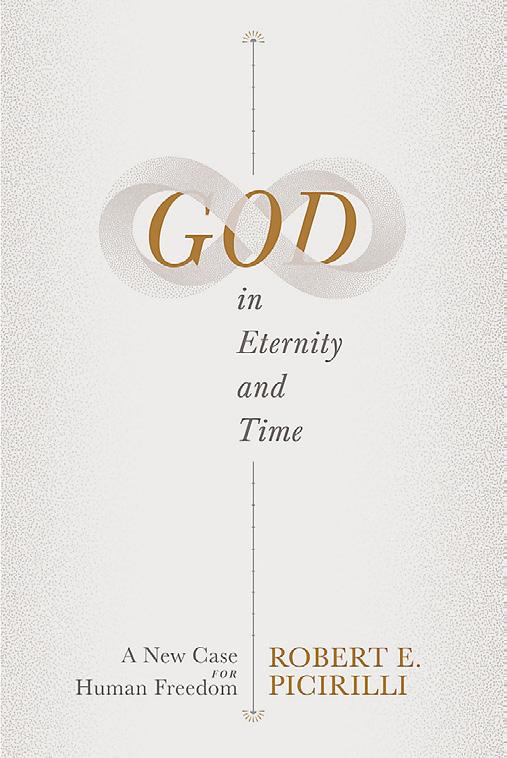

What does this have to do with human freedom? Picirilli argues the biblical account clearly depicts God interacting with humans in an influence-response relationship. The God of the Bible—the God of eternity who is also the God of time—presents humans with choices, and they are free, if only by grace, to decide in more than one way. God wills to respond to such free choices with either blessings or curses. “One who misses that relationship misses everything. If one sees the meaning of the events in history as secondary or controlled or caused by God’s eternal purposes,” writes Picirilli, “one has turned reality on its head” (page 54; cf. 74). But that is precisely what determinists do when they contend God, in eternity, willed everything to come to pass.
In part two, Picirilli discusses God’s foreknowledge, which “appears to present a problem, at least a logical one, for human freedom and contingencies in the real world… if God knows in advance what will transpire in the real world, then what he knows must therefore transpire” (page 79). Determinists hold that God’s foreknowledge necessitates His foreordination of those events. Thus, they deny human freedom. Open theists also hold that God’s foreknowledge of future events necessitates His foreordination of those events. However, due to their commitment to human freedom, they deny God’s exhaustive foreknowledge.
Against both views, Picirilli argues (as he did in his earlier work Grace, Faith, Free Will) that divine foreknowledge does not preclude human freedom, nor does human freedom preclude divine foreknowledge. He aptly demonstrates divine foreknowledge does not equal causal necessity. Building on his arguments from part one, Picirilli argues: “whatever God knew and decided in eternity, he knew and decided in consideration of what [humans]
actually did in time. . . . Their choices were determined in real time and space in the very way such choices are determined, in the very way the biblical record depicts them—self-determined, that is” (page 92).
In this section, Picirilli also argues against Molinism, which holds that God, in eternity, decreed to arrange the world in such a set of circumstances that free agents would make the choices He desired them to make. “Like determinists, Molinists tend to focus on what God knew and decided and did in his eternal existence and then to allow that focus to dominate their view of what happens in time and space,” Picirilli writes. “Instead, we ought to focus primarily on what God does in time and space, as revealed in the Bible, and allow that vision to provide an understanding of what he has done in eternity” (page 175).
The final section, essentially, summarizes the preceding chapters and invites readers to accompany Picirilli on a walk through the Exodus narrative to illustrate the point he has been making all along: “the God at work in Exodus is God at work in eternity, and these two are one and the same” (page 197). That is, we understand God’s eternal purposes by His dealing with free agents in the time and space He created.
God in Eternity and Time demonstrates Picirilli’s deep and abiding commitment to Scripture as the final authority for all theological work. He calls us to hear God’s Word and humble ourselves before it, to let Scripture have the final word.
Prospective readers should be aware this work, published by B&H Academic, is geared towards an academic audience. Without question, Picirilli deals with heavy topics here, and heavy topics require the reader to do some heavy lifting. Nonetheless, Picirilli’s healthy use of illustrations, especially well-known biblical illustrations, and clear style make this work accessible to any pastor or layperson willing to put in the effort. This book can be purchased at Amazon or Lifeway.com.
ONE Magazine April-May 2023 | 57
8 7 t h NATIONAL CONVENTION




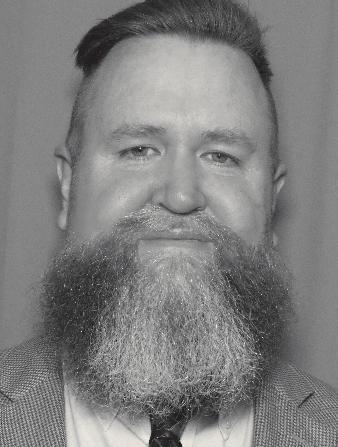
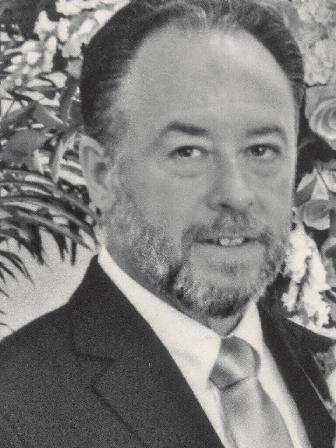

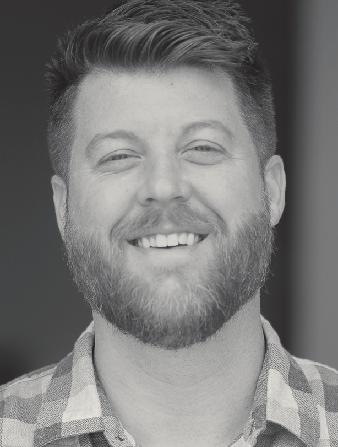






















e 87th Free Will Baptist National Convention will meet July 16-19 in Raleigh, North Carolina. As the denomination returns to the “City of Oaks” for only the second time (1965), attendees will consider the theme “As for You.” Sunday morning, Bruce Barnes (VA) and Butch Taylor (GA) will challenge listeners to continue in the Word (2 Timothy 3:1-13). Sunday evening, Gene Williams (NC) will underscore the importance of encouraging one another in the Word (1 essalonians 5:1-7). Monday evening, Faron ebeau (MO) will urge listeners to reach with the Word (Acts 8:26-40), followed by Amos Dillard (CA) on Tuesday, who will examine teaching and training others in the Word (Titus). During the concluding Wednesday evening missions service, Ken Cash (NC, Bulgaria) will offer the challenge to give ourselves as laborers (Matthew 9:35-38; 10). Individuals interested in participating in music for convention worship services may contact coordinator Kevin Justice (kevin@unityfwb.org) for consideration. Visit fwbworship.com for more details.
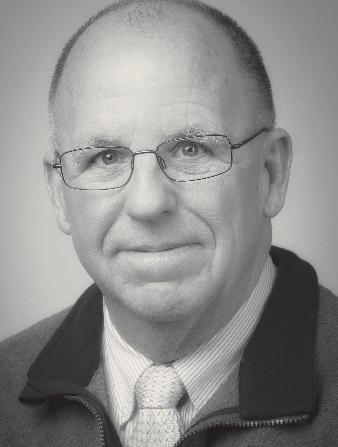
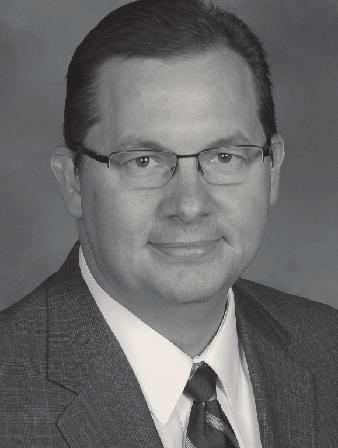





Attendees to this year’s convention will enjoy scores of Seminars, Panels, and Workshops presented by various departments and agencies of the denomination. Convention-goers are also encouraged to arrive a day early to participate in IMPACT, a one-day evangelistic campaign of service and outreach. For more details or to register, visit fwbmastersmen.org. Find regular convention updates at www.nafwb.org/convention. We’ll see you in Raleigh!

RALEIGH, N C | JULY 16-19, 2023
Amos Dillard (CA)
Tuesday Evening
Sunday
Bruce Barnes (VA) Sunday School Butch Taylor (GA)
Morning
Sunday
Monday
Gene Williams (NC)
Evening
Faron Thebeau (MO)
Evening
Wednesday
NAFWB.ORG/ CONVENTION 58 | ONE Magazine April-May 2023
Ken Cash (NC, Bulgaria)
Evening
P re -Registration
2023 NATIONAL ASSOCIATION OF FREE WILL BAPTISTS
NAFWB
Required for All Convention Events
National Association (All voting delegates must be members in good standing of a FWB church.)
Voting Delegates
❏ National Board/Commission Member
❏ Ordained Minister
❏ Ordained Deacon
❏ State Delegate (Authorization Required)
❏ Local Church Delegate (Delegate Card Required)
Non-Voting
❏ Attendee (All Ages, Including Infants and Toddlers)
Vertical Three Conference
Preschool
❏ Ages 3-5, Attending Preschool Worship - $25 ($35 onsite)
❏ Ages 0-5, Not Attending Preschool Worship - NO FEE
Students: $25
Any student or competitor* attending any CTS competition or event MUST pay $25 V3 conference fee ($35 onsite).
❏ Grades K-3
❏ Grades 4-6
❏ Grades 7-12
*Competitors must pay this V3 conference fee in addition to CTS competition fees already paid.
College Age | Adults: $20
Adults attending any competition or event MUST pay $20.
❏ Adult Attendee
V3 Event: Fun With Forrest Qty_______ x $10 = _______

Tuesday, July 18, 9:00 pm ($15 onsite/at the door)
V3 Information: 800-877-7030 | www.verticalthree.com
Tickets
WNAC Laughter and Latté ..................... Qty_______ x $25 = _______
Monday, July 17, 8:30 p.m. ($30 onsite; limited quantity available)
Welch Alumni & Friends Luncheon ...... Qty_______ x $45 = _______
Wednesday, July 19, noon ($55 onsite; no tickets will be sold between pre-registration closing and convention; limited availability onsite)
National Association Info: 877-767-7659 | www.nafwb.org
Register April 3 – June 16 | No Refunds After June 16
Payment Options:
+ Check (Payable to FWB Convention)
+ Visa, Discover, or MasterCard only (both debit and credit cards accepted)
Card # ________________________________________________________________
Card Holder___________________________________________ Exp_____/_______
Signature ______________________________________________________________
NAFWB Questions: 877-767-7659 | convention@nafwb.org
Return to: Convention Registration PO Box 5002 Antioch, TN 37011 / FAX: 615-731-0771
2023 NATIONAL CONVENTION
Office Use Only: Date __________________ CK# ___________ Amt $____________ From_______________________________________________________ First Name _______________________________________________ Last Name Home Address ____________________________________________ City ________________________________ State __________ Zip ____________________ Country (if outside USA) ___________________________________ Email Home Phone _____________________________________________ Cell Phone _________________________________________________________________ Church You Attend ________________________________________ Church City ___________________________________ State
One Form Per Person | Register Online: www.nafwb.org | Name Badges
| V3 | Raleigh, North Carolina | July 16-19
Raleigh Marriott City Center 500 Fayetteville Street
Raleigh NC 27601
888-236-2427
Room Rate: $169
Valet Parking: $30 per night
Self-Parking: $15 per night
Sheraton Raleigh Hotel
421 South Salisbury Street
Raleigh NC 27601 919-834-9900
Room Rate: $169
Self-Parking: $15 per night
Residence Inn Downtown Raleigh 616 South Salisbury Street Raleigh NC 27601 919-856-0017


Room Rate: $144

Self-Parking: $15 per night
2023 Convention Housing Information
1. Prepare personal information.
You will need the following:
+ Name(s), address, city, state, zip
+ Phone/email
+ Credit card information
+ Special requests: accessibility, rollaway, or crib
2. Make reservations.
+ Online reservations open Monday, May 8, 9:00 a.m. CDT. Links to make reservations will be available at www.nafwb.org.
+ The group code (for the convention rate) will be built into the reservation links.
+ Contact the hotel directly for changes to reservations or issues with a reservation. Note: NAFWB is not responsible for housing issues.
3.
+ Hotels have been told not to accept reservations before opening day.
+ Hotel rates do not include 13.25% tax.
NOTE: The first night's room and tax will be charged for canceled reservations. The charge is non-refundable, but reservations are transferable. Available rooms may be posted at nafwb.org for transfer. Note: Convention policy supercedes hotel policy.
Things to remember:
Reservation cut-off date: Friday, June 16, 2023 Visit www.nafwb.org for more info.
Former Moderator With the Lord
Ft. Smith, AR—Former moderator of the National Association of Free Will Baptists Carl Cheshier went to his eternal reward Monday, February 13, 2023, in Fort Smith, Arkansas.
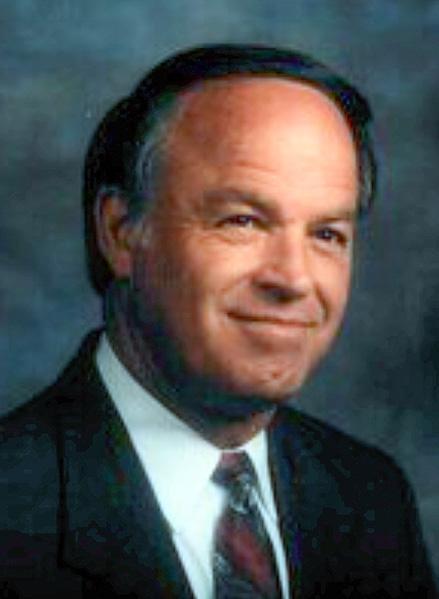
Born July 2, 1938, in Lindsay, Oklahoma, Cheshier graduated in 1955 from Capital Hill High School in Oklahoma City. He married Barbara Louis Brimm, and the couple had two children, Philip and Rebecca.
After being ordained in 1957, Carl lived a life of ministry spanning six decades, four states (Arkansas, California, Oklahoma, and Texas), six churches, and the presidency of a college. His most extensive pastoral ministry took place at Cavanaugh FWB Church in Fort Smith, Arkansas, where he stayed 28 years before accepting the presidency of Hillsdale Free Will Baptist College (now Randall University) in Moore, Oklahoma, where he served nine years.
Following his time at Hillsdale, Cheshier started Com-
munity Free Will Baptist Church in Pocola, Oklahoma. Though Carl retired from full-time ministry in 2012, before long he returned to ministry at Cornerstone FWB Church in Roland, Oklahoma, where he pastored until his death.
In addition to pastoral ministry, Cheshier involved himself in denominational work at every level: Arkansas State Missions Board, Arkansas state moderator, and the national Sunday School Board. He also served nine years as assistant moderator of the National Association (1988-1997) and moderator six years (1997-2003).
Current moderator Tim York, who served as Cheshier’s assistant moderator, recalls his leadership: “When I think of Brother Carl, I think of a genuine leader, friend, and shepherd of people. Serving as his assistant moderator was an educational and inspirational experience because of his ability to smile in the midst of controversy or chaos.”
A celebration of Cheshier's life was held Friday, February 17, at Cornerstone FWB Church.
Southeastern Free Will Baptist College Announces Upcoming Events
Wendell, NC—Southeastern Free Will Baptist College announces two upcoming summer events. First, the Youth Aflame conference for students grades 7-12 will be held June 19-22 at the Ramsey Hotel and Convention Center in Pigeon Forge, Tennessee.

Director Steve Berry notes: “Youth Aflame is more than just a youth conference. It is a time when students will choose to dedicate their lives to God, desire to seek His presence, and ultimately have a soul on fire for Jesus Christ.”
Learn more: youthaflame.com.
Second, during this year’s National Convention in
Raleigh (July 16-19), the college will host a banquet for alumni and partners to celebrate the 40th anniversary of the school. Learn more about the event: sfwbc.edu.
. . . . . . . . . . . . . . . . . . . . . . . . . . . . . . . . . . . . . . . . . . . . . . . . . . News About the Denomination
ONE Magazine April-May 2023 | 61
Carl Cheshier
BETTER TOGETHER
The Gift of Encouragement
BY EDDIE MOODY
Flight attendants, teachers, nurses, law enforcement officers, shop keepers, government leaders, pastors— just about everyone seems a bit discouraged these days. We seem long removed from the proverbial “Home on the range…where seldom is heard a discouraging word.” These days, we are more likely to encounter signs like “Please be patient with our staff. We are short-handed.”
Today, discouragement is pervasive and overwhelming. What can we do about it? We can share the gift of encouragement.
Does encouragement really help? Sometimes, the situation seems so dire an "attaboy" seems ineffective. But we find two clear encouragement models in Scripture who did some of their best work during darkest times. Take Boaz, who encouraged others during the times of the judges (Ruth 1:1). I can become discouraged just reading about those dark days (Judges 9, 11, 19). We also read about Barnabas (Acts 4:36) who encouraged the early church when Christians were being threatened and persecuted (Acts 4:7, 21).
Perhaps one of Satan’s biggest lies is our gift of encouragement will be ineffective. Scripture teaches the value of encouragement (1 Thessalonians 5:11-15), and research bears this out. For example, encouragement enhances marital satisfaction,1 is a key component of successful parenting, 2 is critical to the development of resilience in families, 3 and is important in the development of leadership skills. 4 How can we give the gift of encouragement?
Smile. Smiling doesn’t just help us (Proverbs 15:30); it helps those around us. 5 We see this in Ruth 2:4. When Boaz walked through the fields and told workers, “The Lord be with you,” I believe he was smiling. And he elicited a positive response from the workers, “The Lord bless you,” indicating his interaction had a positive effect. We can behave similarly when boarding a plane, eating out, receiving medical treatment, or even responding to an officer after being pulled over, although this one is difficult!
Speak. A smile is the first step, but words are also
needed. The right word at the right time can be very encouraging (Proverbs 25:11). Look for ways to speak encouragingly to strangers (Ruth 2:10, 13). Use words like “You are really handling a difficult situation well” or “I appreciate your presence in this trying time.”
Spoken encouragement also can be developmental in nature. Perhaps Barnabas told Paul, “I think you would be an excellent church planter” or John Mark, “I believe you would do well on a missionary journey.” When John Mark left him, I imagine him saying, “I still believe you can succeed.” While we don’t know exactly what Barnabas said, we know for certain he was an encourager, and, in both cases, we have evidence of good results (2 Timothy 4:11).
Write. We do well to write letters to pastors, government leaders, merchants, friends, and neighbors detailing our appreciation for tasks performed or time given. Even a short note can be encouraging, especially when those individuals typically receive criticism rather than appreciation.
Let’s make time to share this gift we call encouragement.
Eddie Moody Executive Secretary, National Association of Free Will Baptists

1 D. Rainey and B. Rainey. Building Up Your Spouse. Little Rock, Arkansas: Family Life. 2013.
2 L. A. Roggman, G. A. Cook, M. S. Innocenti, V. Jump Norman, and K. Christiansen. Parenting interactions with children: Checklist of observations linked to outcomes (PICCOLO) in diverse ethnic groups. Infant Mental Health Journal, 34, 290-306. 2013.
3 F. Walsh. Family resilience: A framework for clinical practice. Family Process, 42, 1-18. 2003.
4 D. Dinkmeyer, & L. D. Eckstein. Leadership by Encouragement. Boca Raton, FL: CRC Press. 1996.
5 J. Nikitin, & A. M. Freund. The Motivational Power of the Happy Face. Brain Science, 9(1):6. 2019.
62 | ONE Magazine April-May 2023


Tired of the volatility? 877-336-7575 www.fwbgifts.com Market ups and downs can be unnerving. Level things off with a charitable gift annuity through FWB Foundation. The annuity pays secure, fixed income for life in exchange for a gift to a Free Will Baptist ministry. Stop worrying about the next downturn and enjoy financial peace of mind while making a difference for ministry. Contact the Foundation today! Age Rate Ages Rate 65 5.4% 65/65 4.7% 70 5.9% 70/70 5.2% 75 6.6% 75/75 5.8% 80 7.6% 80/80 6.5% 85 8.7% 85/85 7.7% 90 9.7% 90/90 9.4% Single Table Joint Table A Christian Community of Faith and Learning est. 1942 Welch.edu
Age-aligned lessons and devotions
Creates conversations at home
Covers story of the Bible in 3 years
The FAMILY DISCIPLESHIP curriculum you love and trust just a whole lot better!
The FAMILY DISCIPLESHIP curriculum
you love and trust just a whole lot better!
Introducing NEW 2-month blocks for teaching and devotional study guides
Features apologetics woven into the lessons
onSpotlight biblical characters
Build lasting foundations for your church and home with D6. Develop strong biblical worldviews and apply the unchanging truth of God’s Word with D6 EveryDay Foundations.
D6 EveryDay Foundations continues the Church and Home focus, family alignment, holding a high view of Scripture, and shaping a strong biblical world-view, along with solid application of the unchanging truth of God’s Word.

SEPTEMBER 2023
D6FAMILY.COM
























































































 BY RUTH MCDONALD
BY RUTH MCDONALD
































































































